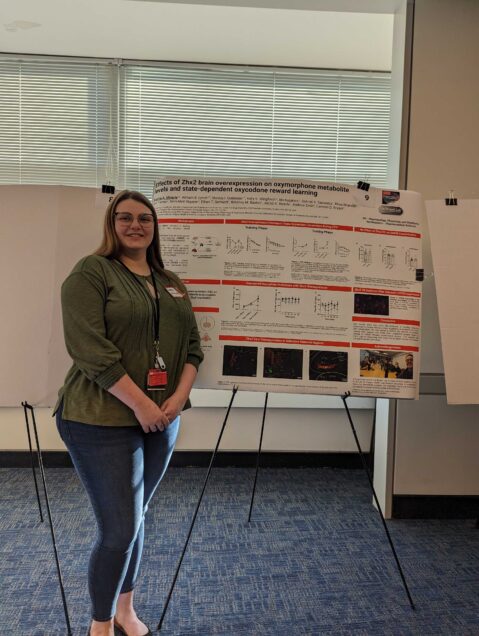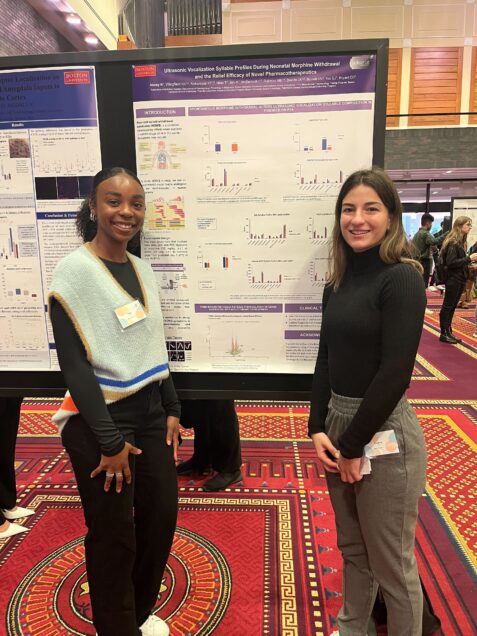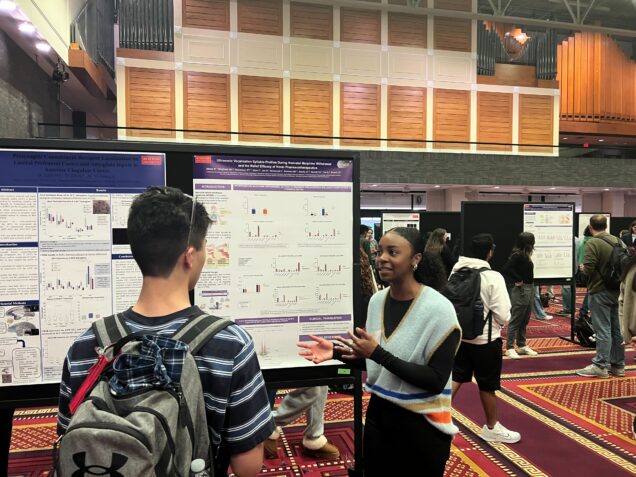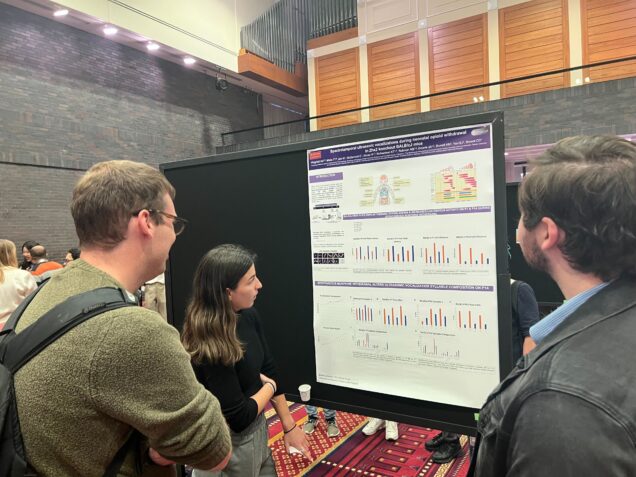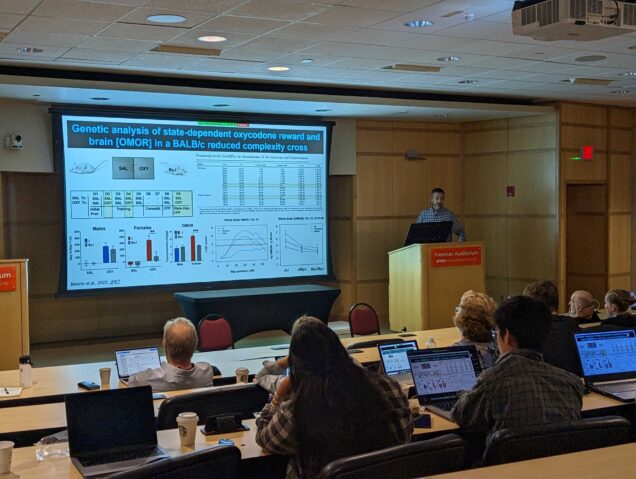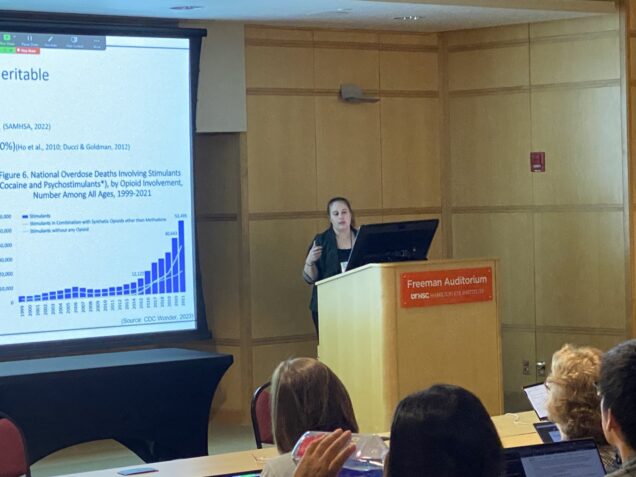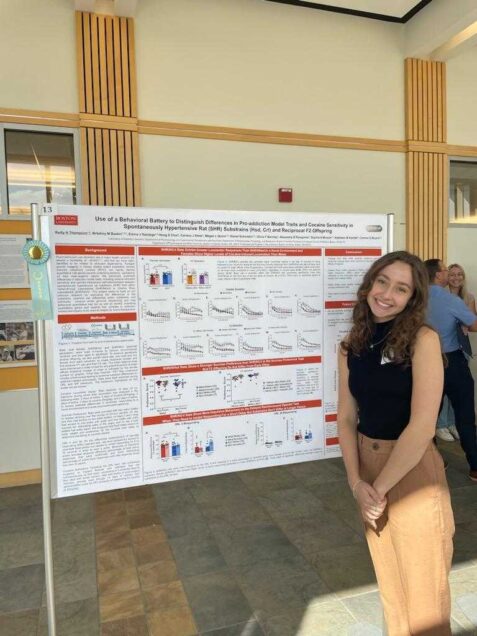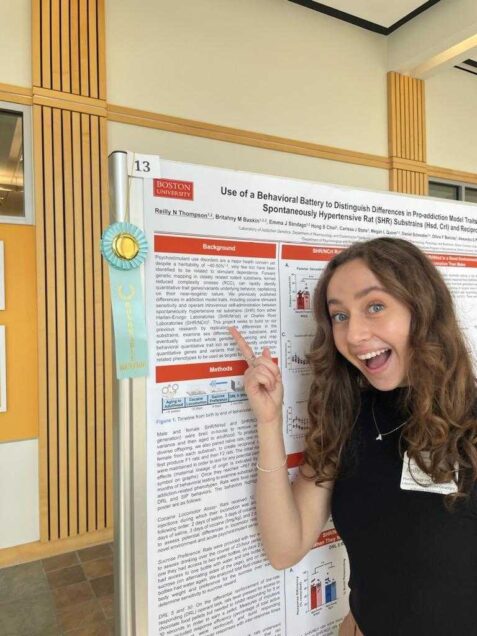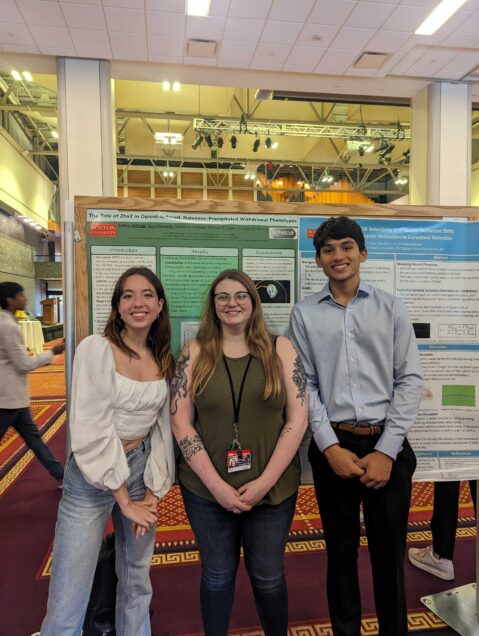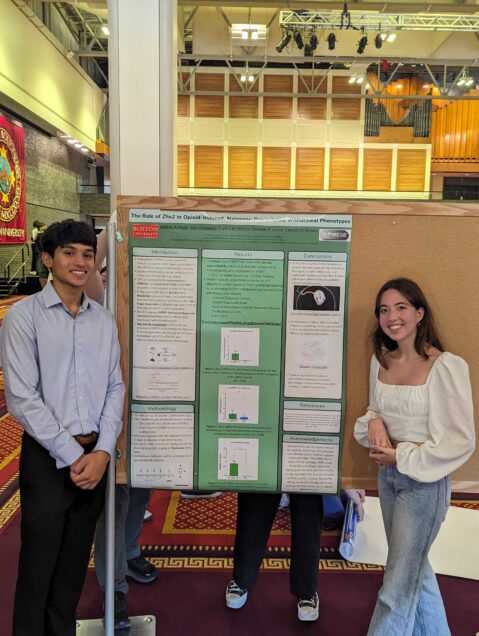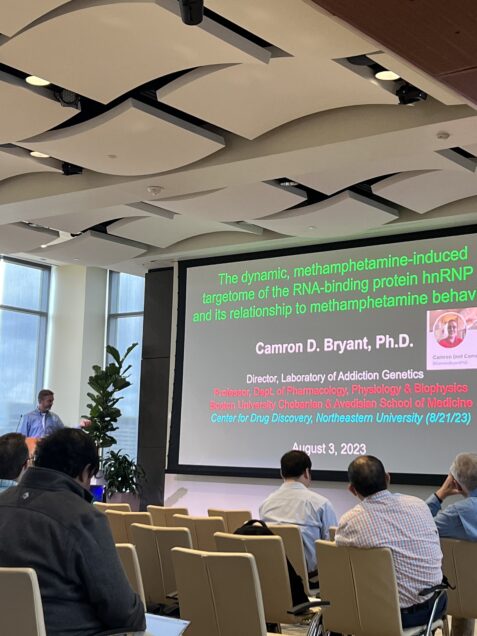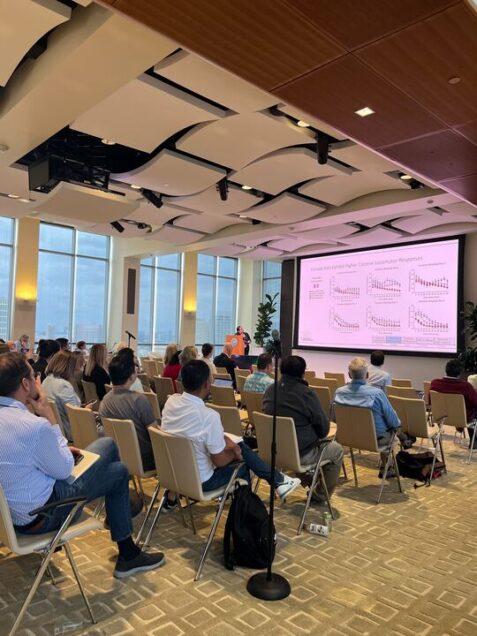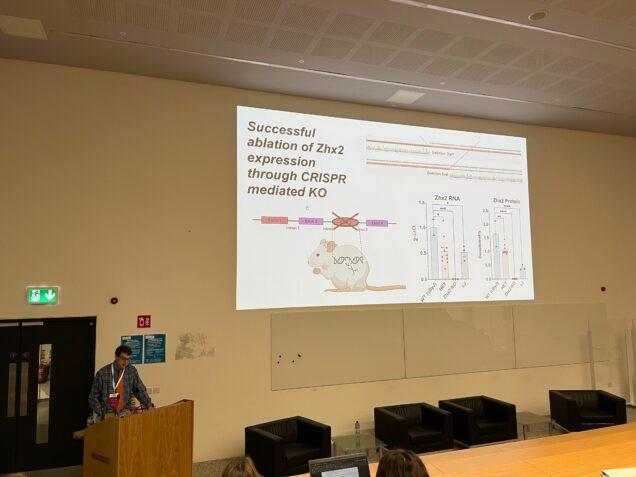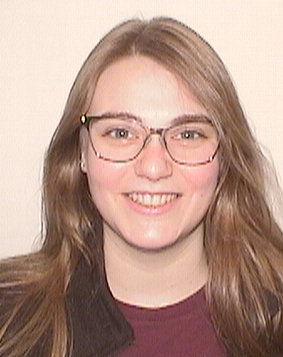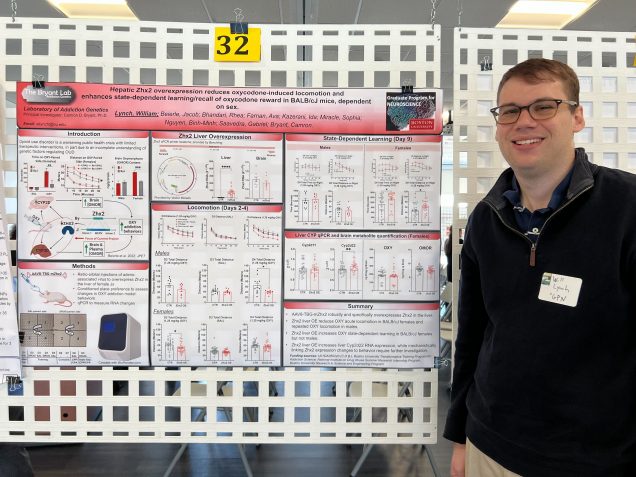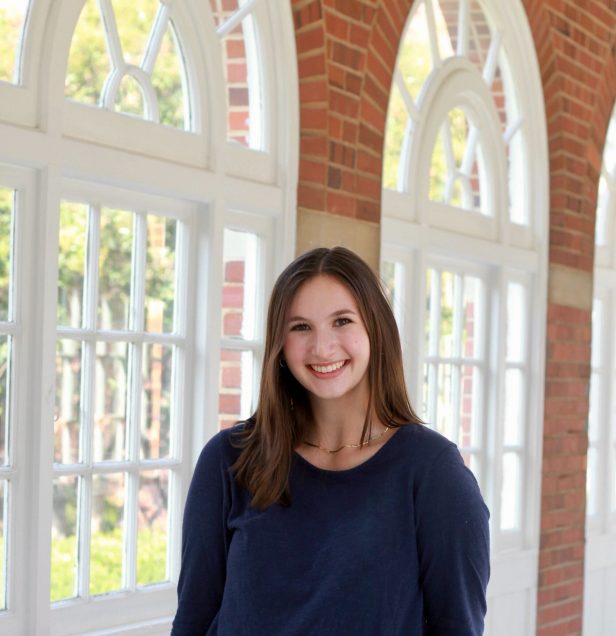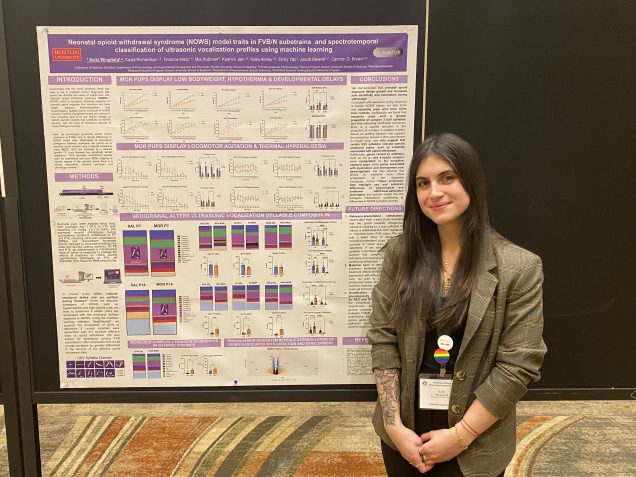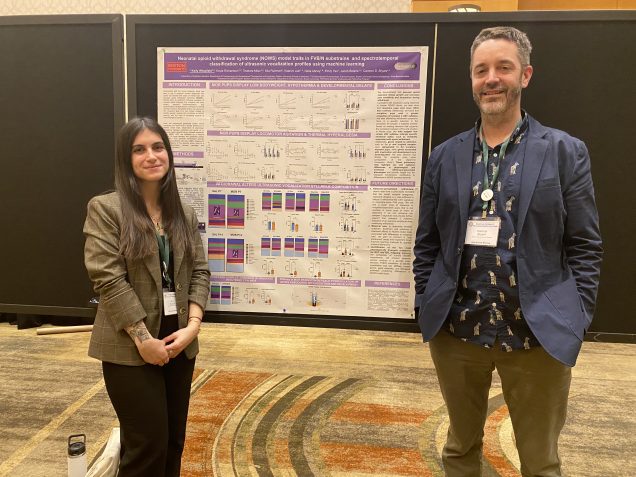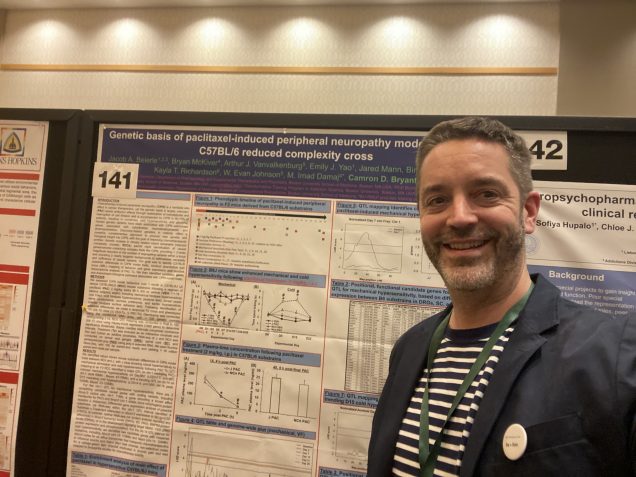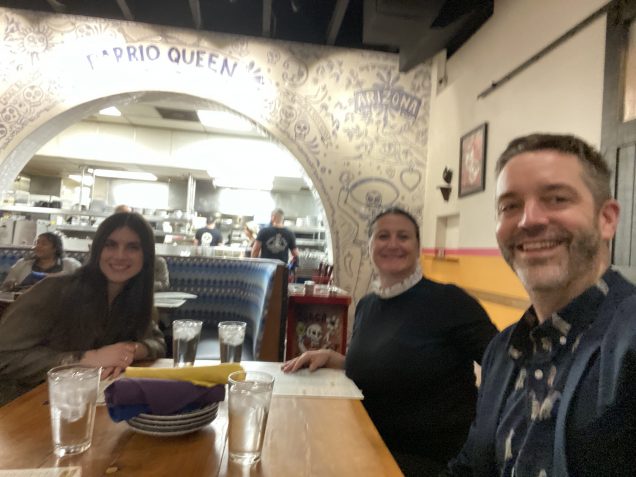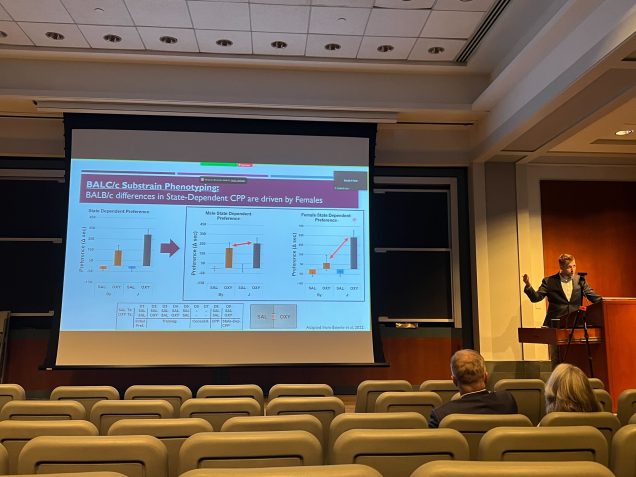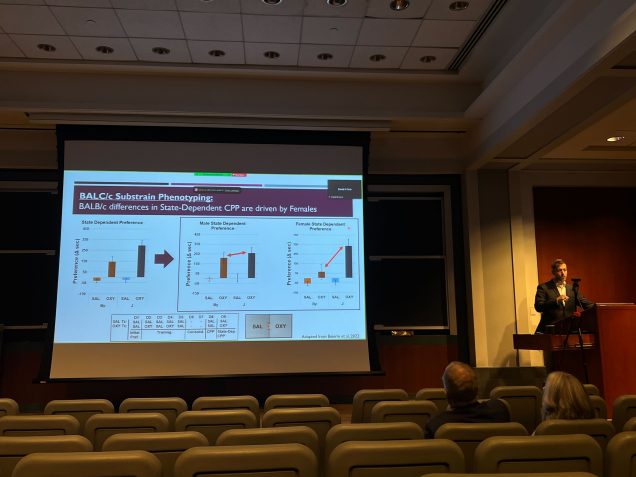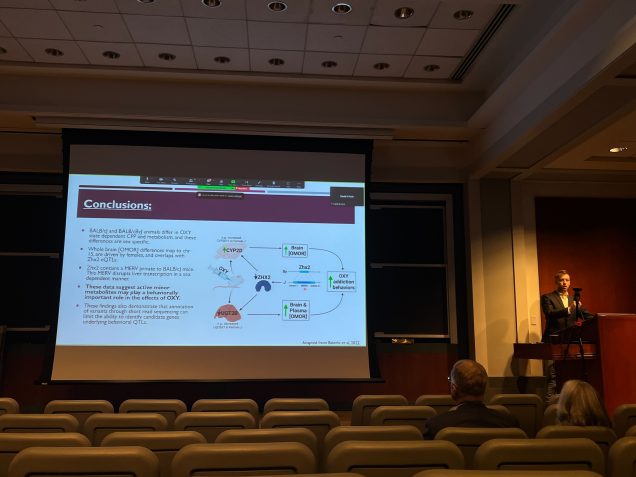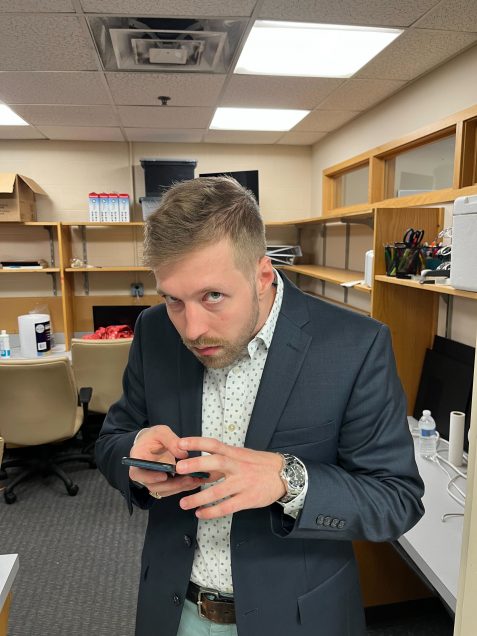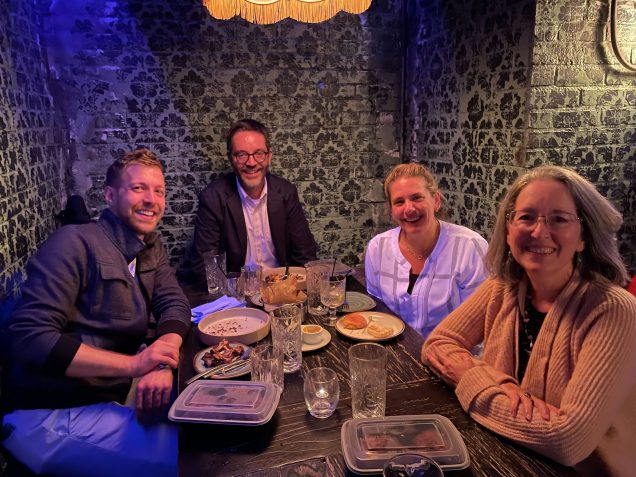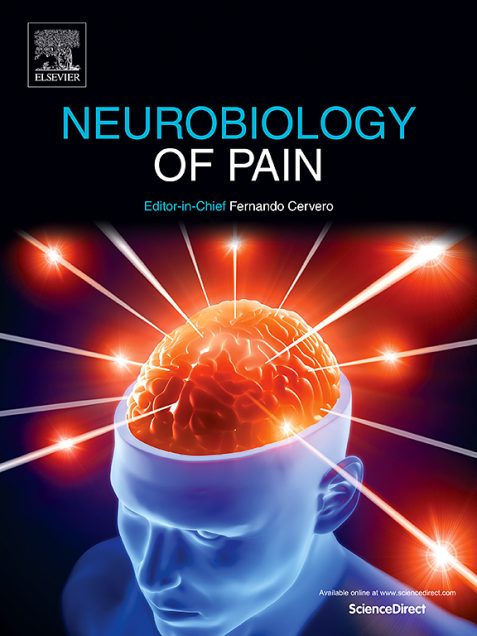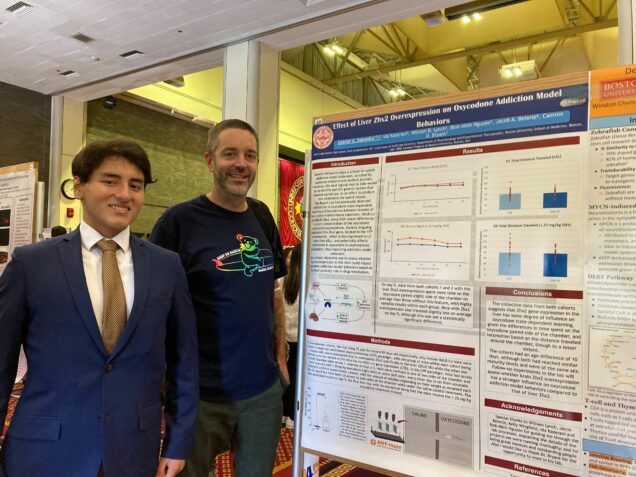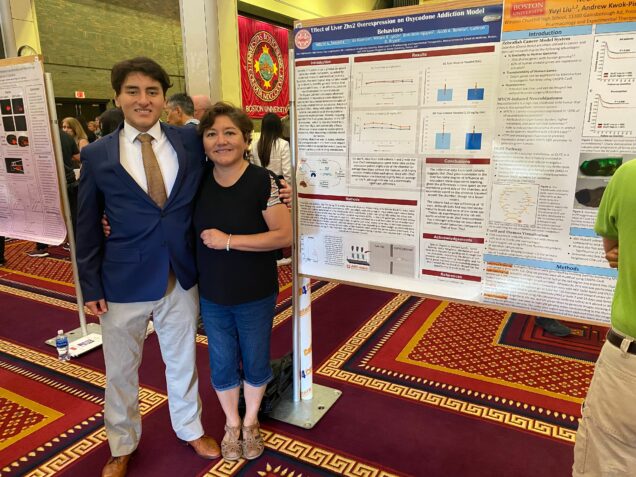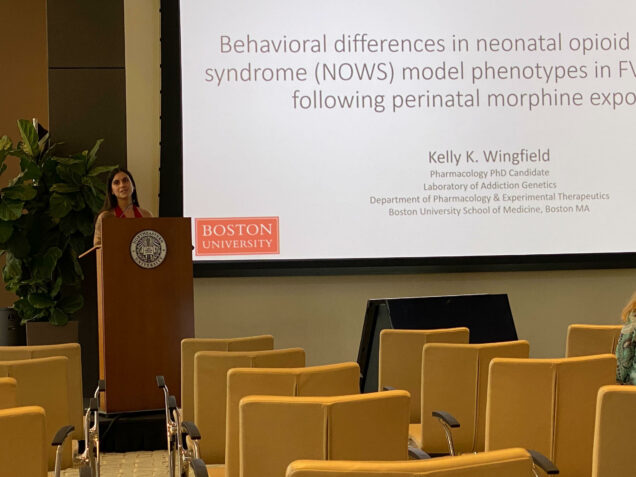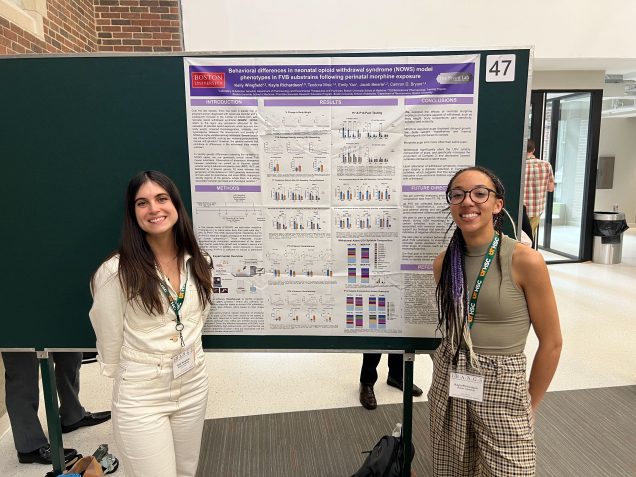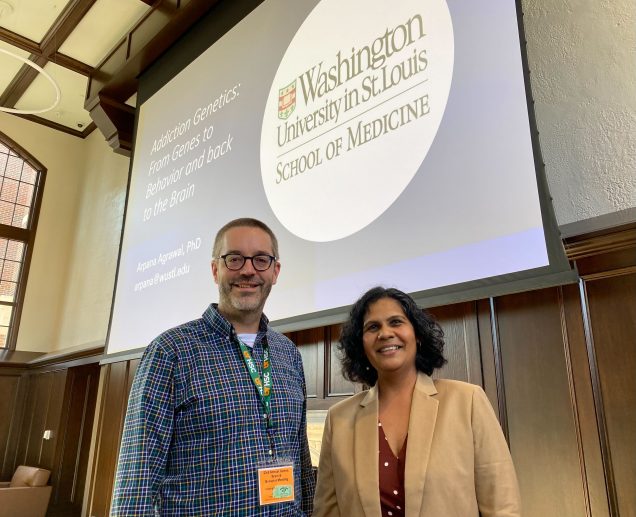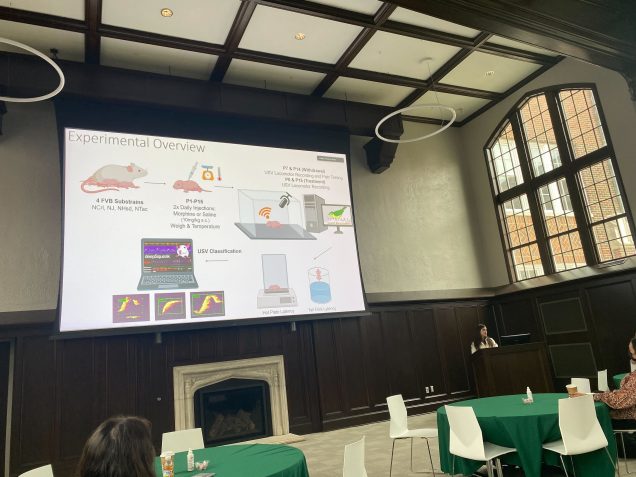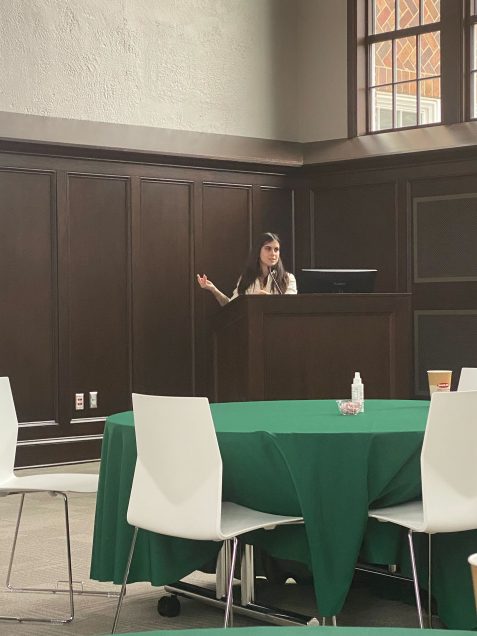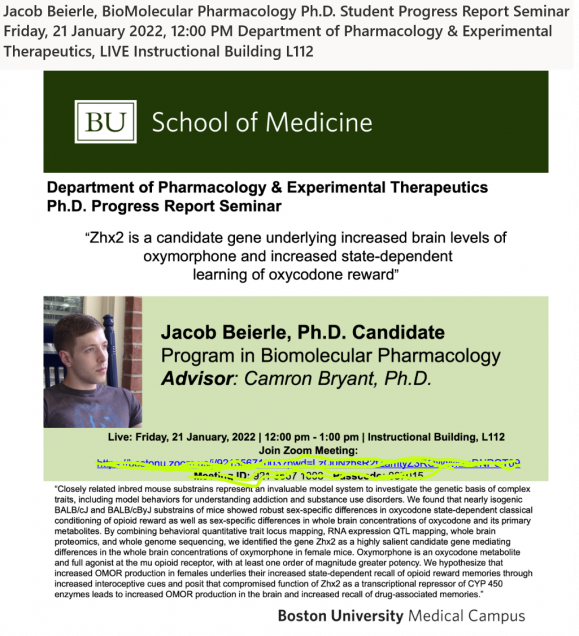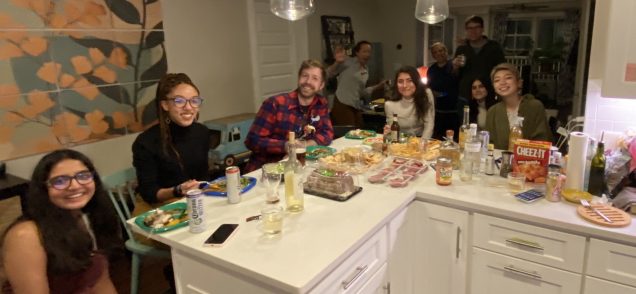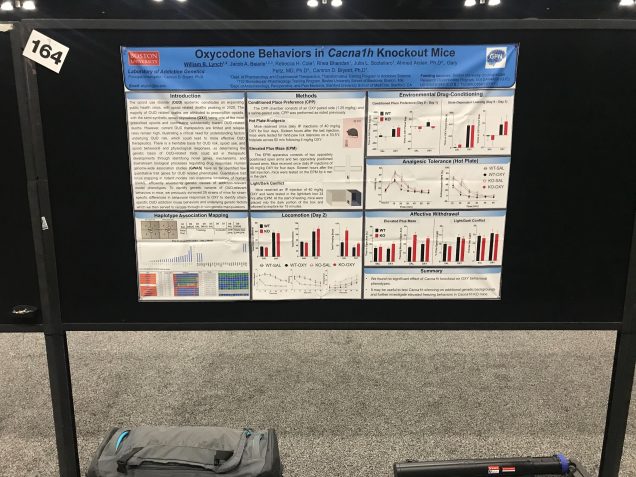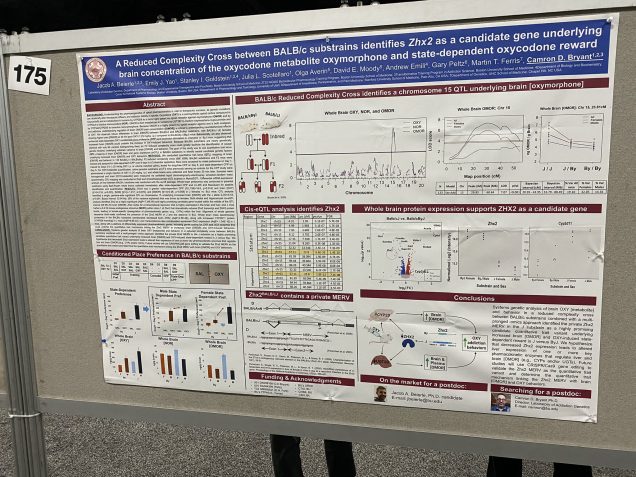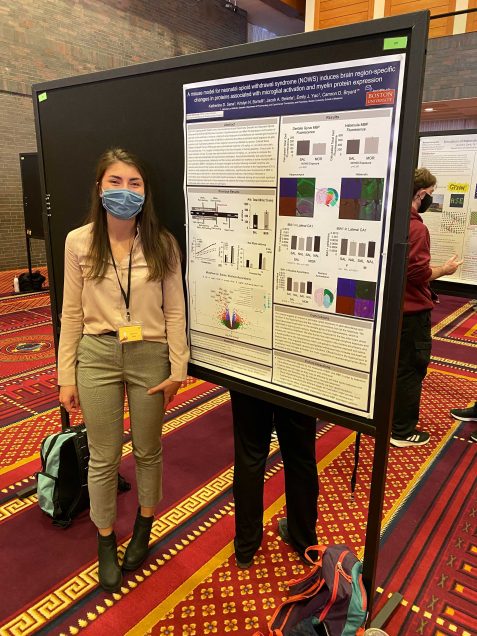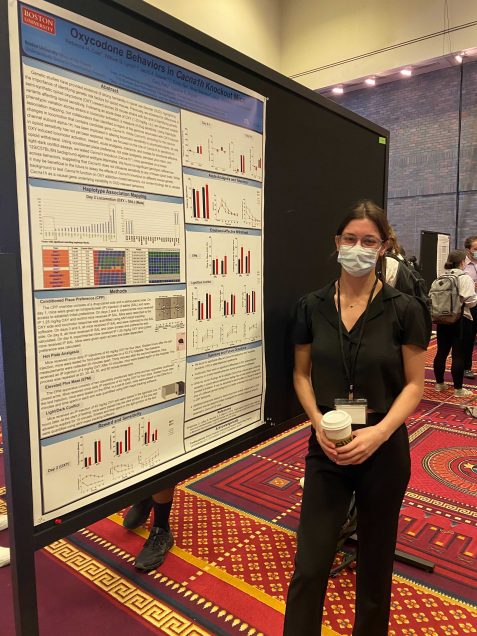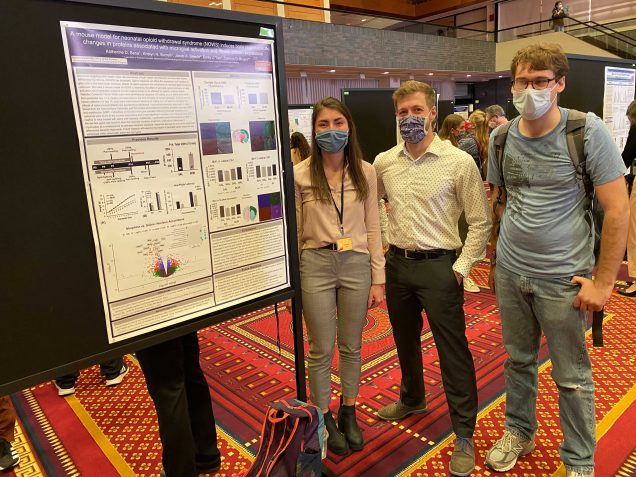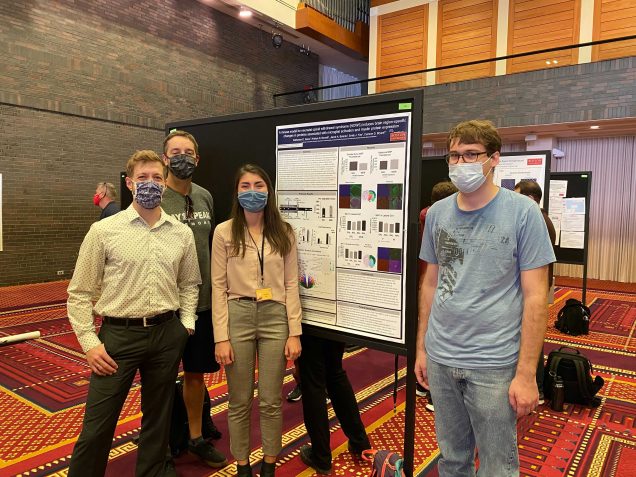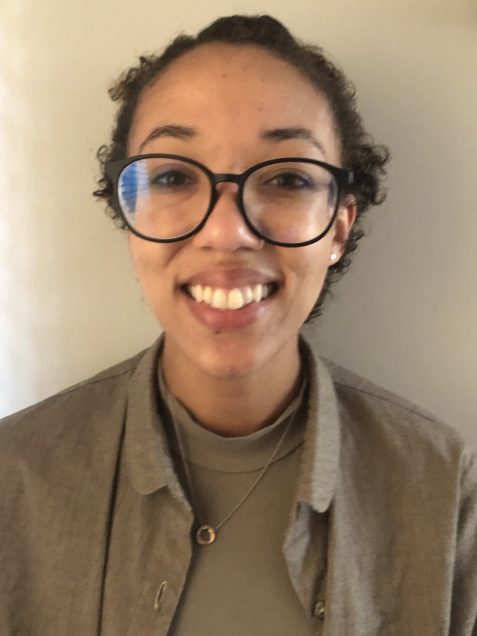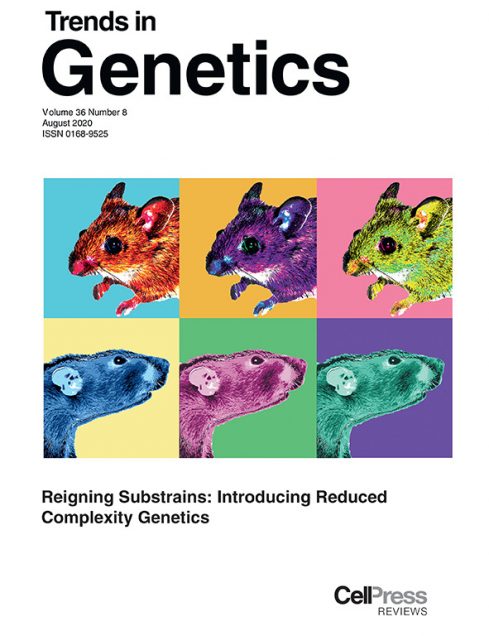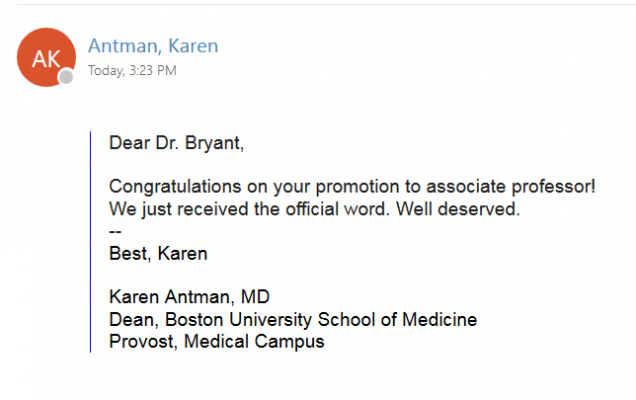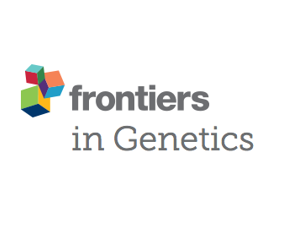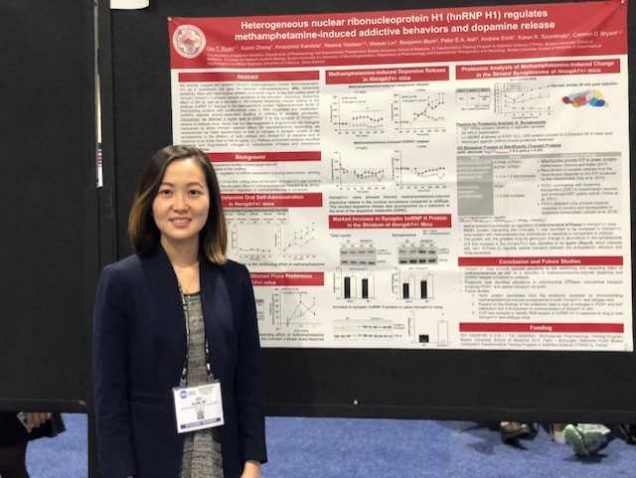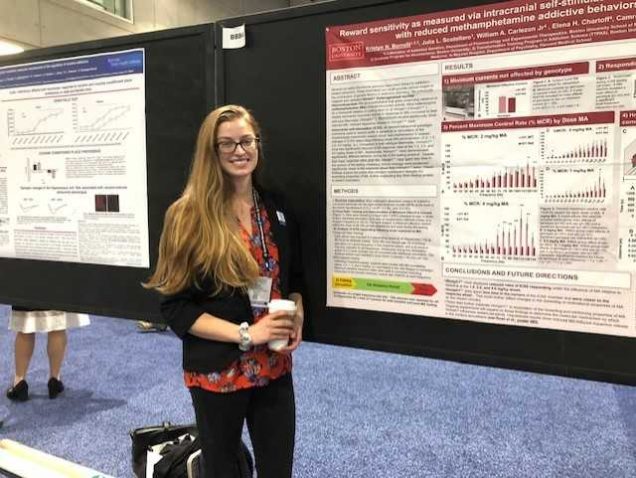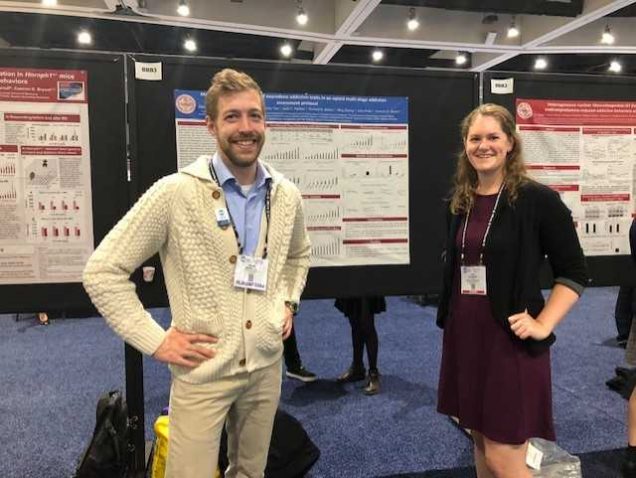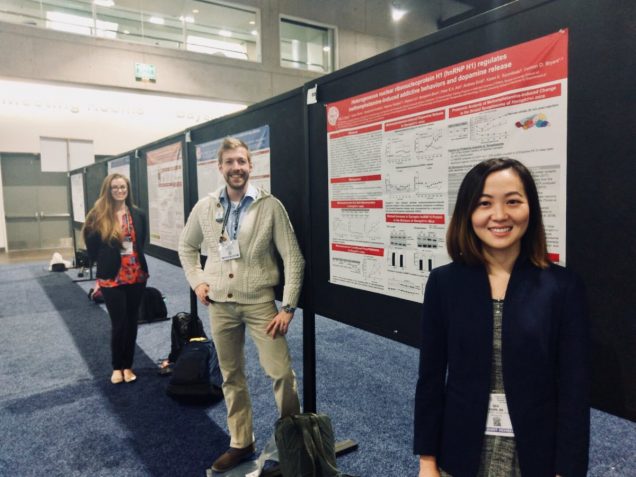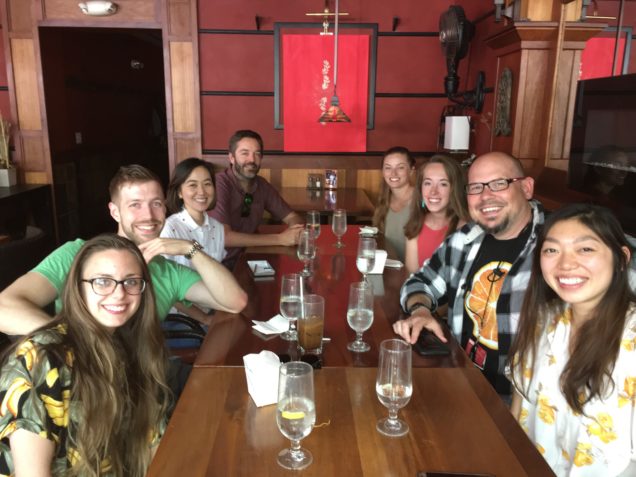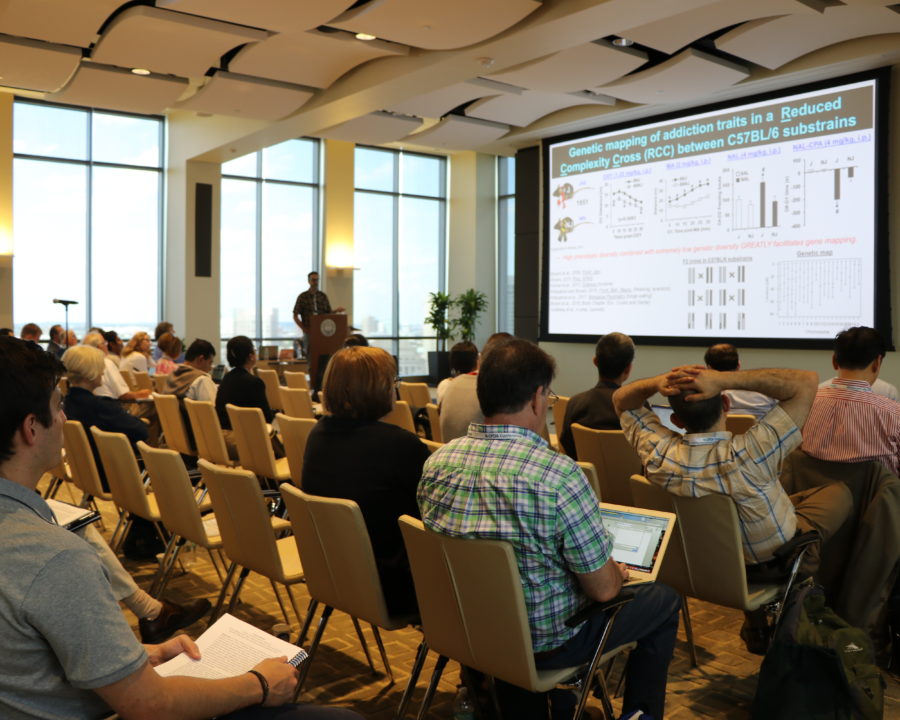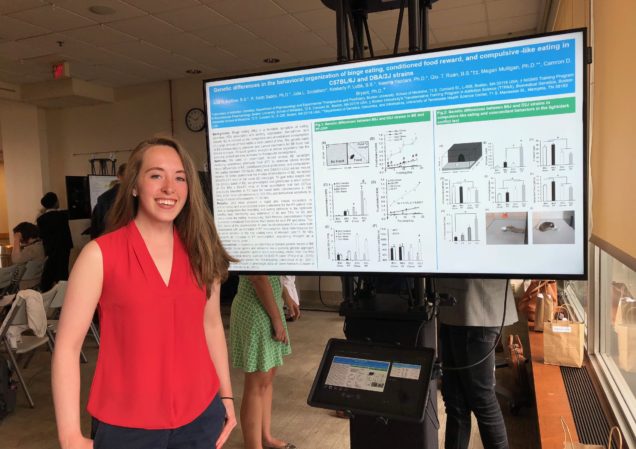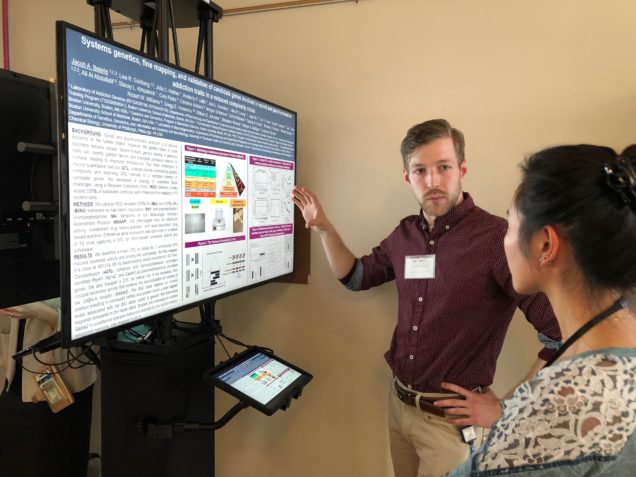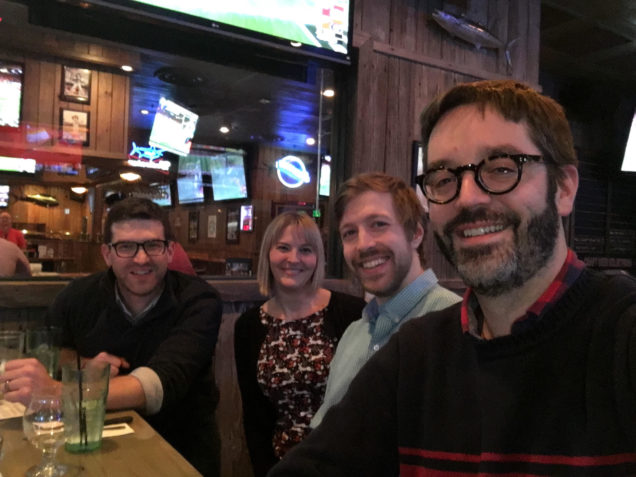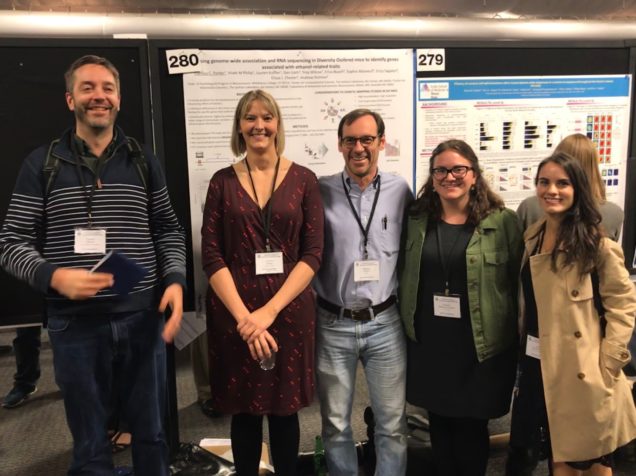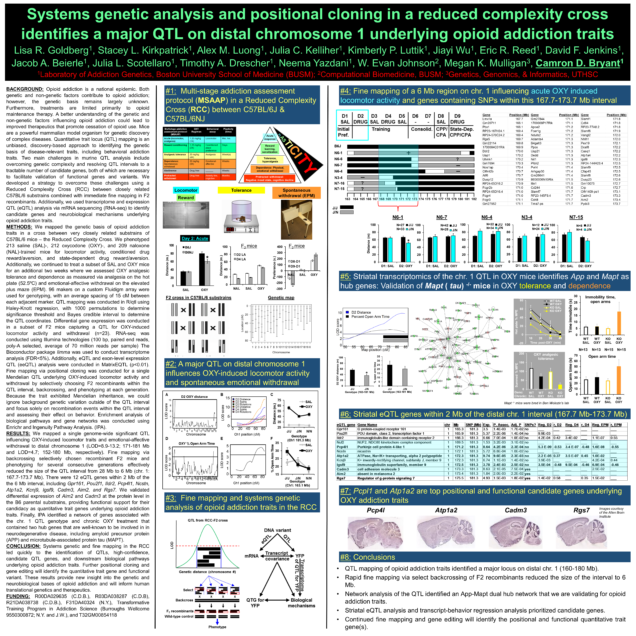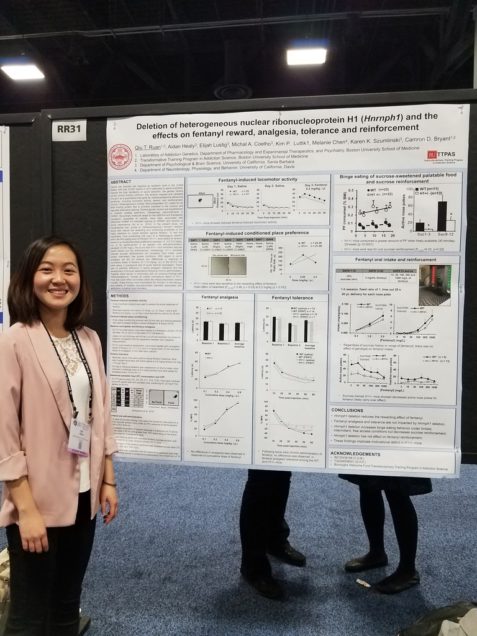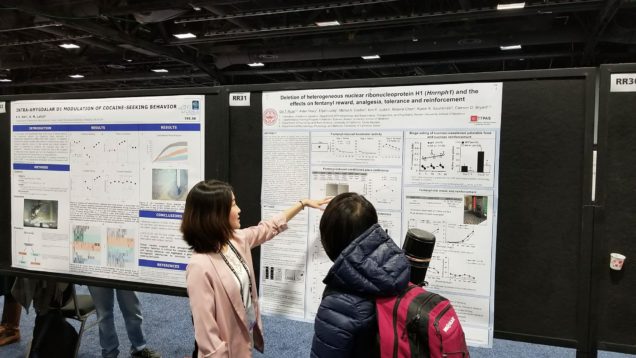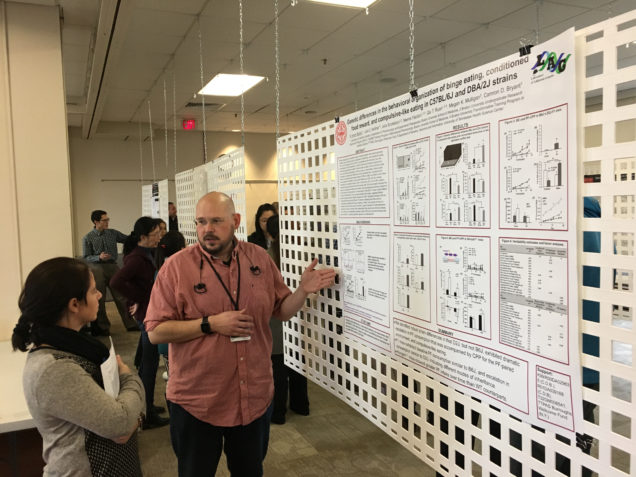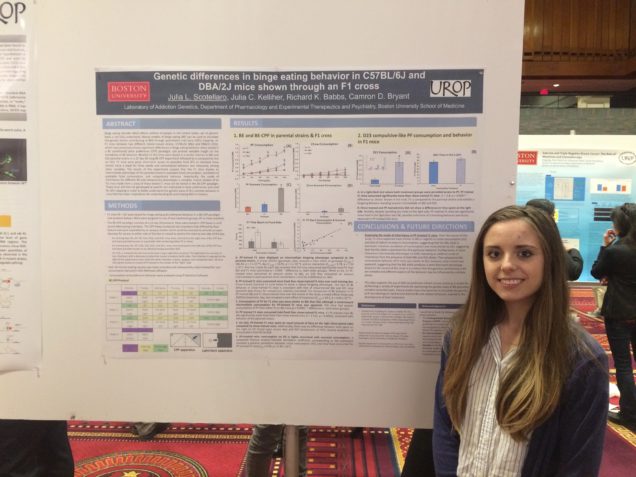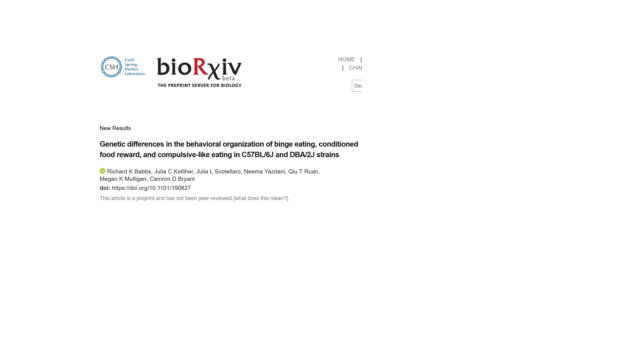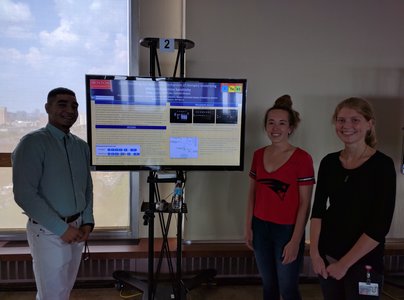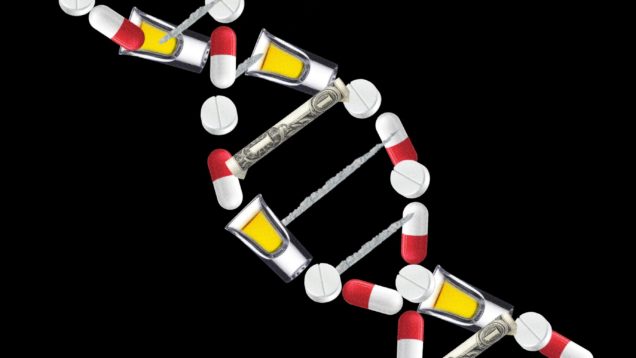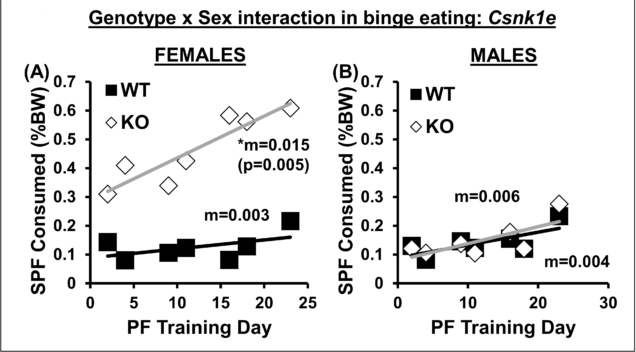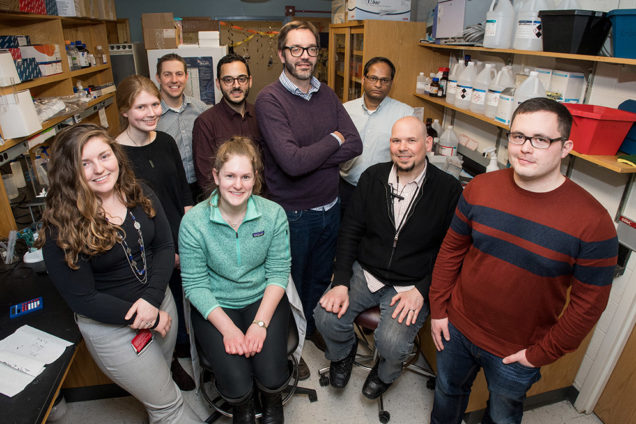News
October 31, 2023: Sophia Miracle (PhD student, GPN) presents her poster (invited), “Effects of brain Zhx2 overexpression on oxymorphone metabolite levels and state-dependent oxycodone reward learning” at the “PhD on Tap” event sponsored by the Professional Development and Postdoctoral Affairs at Boston University. Congrats, Sophia!
October 20, 2023: Nalia Abney and Teodora Misic, undergraduate researchers working with Kelly Wingfield (PhD Candidate, Biomolecular Pharmacology) present their posters on ultrasonic vocalization analysis in a mouse model for neonatal opioid withdrawal syndrome at the annual UROP symposium. Lots of traffic, as you can see! Congrats to both of you!
October 9, 2023: I presented Will Lynch’s (PhD Candidate, GPN) and Sophia Miracle’s (PhD Student, GPN) work at the 2023 Complex Trait Community Meeting at UTHSC in Memphis, TN. The title of the talk was a doozy, “Oxycodone addiction model behaviors following constitutive, reciprocal Zhx2 gene editing vs. adult brain/liver viral overexpression in BALB/c substrains.”
October 9, 2023: Britahny Baskin (postdoc) presents her newly analyzed data, “Spontaneously Hypertensive Rat substrains and the offspring of reciprocal F2 crosses exhibit differences in model risk traits for addiction and cocaine stimulant sensitivity” at the 2023 Complex Trait Community Meeting at UTHSC in Memphis, TN. The talk was very well-received, lots of questions! Congrats Brit!
October 6, 2023: Sophia Miracle’s abstract, “Effects of Zhx2 overexpression on oxymorphone metabolite levels and state-dependent oxycodone reward learning” was selected for a poster for Boston University’s PhD on Tap that will take place on Halloween 2023 at the Photonics Colloquium Room. Congrats Sophia!
October 2, 2023: Reilly Thompson, NIDA summer scholar from 2023, presented her research from the Bryant Lab at Wheaton and receive honorable mention! Congrats, Reilly!
September 27, 2023: Ethan Gerhardt was a awarded a UROP award for the fall 2023 semester at Boston University. Ethan is working with Will Lynch (senior PhD Candidate, GPN) to validate CLIP targets identified from an hnRNP H RNA-binding dataset that are associated with differential behavioral responding to methamphetamine. Congrats Ethan!
August 11, 2023: Aditya Anthati and Ines Donnelly present their poster on “The role of Zhx2 in opioid-induced naloxone precipitated withdrawal phenotypes”. They both worked with Sophia Miracle (PhD student, GPN) to optimize high resolution multi-angle recording for future machine learning analysis of opioid withdrawal behavioral repertoires. Congrats Aditya and Ines on what I heard was an excellent presentation! Thank you for choosing our lab. And congrats to Sophia for her excellent mentorship.
August 8, 2023: Will Lynch (PhD candidate, GPN) received his official NOA today for his F31 award (F31DA056217) entitled, “The role of Zhx2 in CYP2D regulation, oxycodone metabolism, and opioid addiction model behaviors.” Congrats, Will! Here is Will and I at the IBNS meeting at Niagara Falls, CA in June on the hotel rooftop bar which was conveniently located on our floor!
August 7, 2023: A new preprint from the lab has been posted with Dr. Kristyn Borrelli (former PhD student, GPN) and Kelly Wingfield (PhD candidate, pharmacology) as co first-authors, titled “Decreased myelin-related gene expression in the nucleus accumbens during spontaneous neonatal opioid withdrawal in the absence of long-term behavioral effects in adult outbred CFW mice”. More preprints coming soon. Stay tuned!
August 4, 2023: Dr. Bryant presented work from Dr. Neema Yazdani (former PhD student, pharm), Dr. Qiu Ruan (former PhD student, pharm), and Will Lynch (PhD candidate, GPN) on Hnrnph1 in methamphetamine behaviors and the RNA-binding targets identified from CLIP-seq that could potentially mediate changes in drug response, including Cacna2d2 and pregabalin as a potential therapeutic.
August 4, 2023: Dr. Britahny Baskin’s abstract was selected for an oral presentation at the annual 2023 Chemistry and Pharmacology of Drug Abuse (CPDA) Conference at Northeastern University. Here is Brit presenting her talk on “Use of a behavioral battery to distinguish differences in pro-addiction model traits and cocaine sensitivity in spontaneously hypertensive rat (SHR) substrains (Hsd, Crl) and reciprocal F2 offspring.” (apologies for not having a better pic!). Congrats Brit!
June 9, 2023: The Bryant Lab is moving to Northeastern University in the fall of 2023! I will be in the Dept of Pharmaceutical Sciences and a member of the Center for Drug Discovery (CDD). We are hiring at all levels (lab manager, tech, students, postdoc). Please reach out directly to me if you are interested. camron at bu dot edu
May 24, 2023: Will Lynch delivers his talk on Zhx2 in oxycodone metabolism and behaviors at the Genes, Brain and Behavior meeting in Galway, Ireland. He nailed it!
April 25, 2023: Sophia Miracle, 1st year PhD student in the Graduate Program for Neuroscience, has joined the Bryant Lab. Sophia will be working on the mechanisms underlying Zhx2 in opioid addiction traits, with an emphasis on opioid withdrawal. In doing so, Sophia will apply machine learning methodologies to better understand the mouse behavioral repertiore during both spontaneous and naloxone-precipitated withdrawal. Welcome to the lab, Sophia!
April 21, 2023: Will Lynch presented his work at the annual Russek Student Achievement Day on the effects of liver overexpresssion of Zhx2 in BALB/cJ mice on oxycodone behaviors.
April 18, 2023: Emma Sandago, new technician on the U01 rat cocaine genetics project, started today. Emma comes to us from South Carolina followed by a brief stint at the Charles River Laboratory in Worcester. Welcome aboard, Emma!
April 3, 2023: Undergraduate Researchers, Nalia Abney and Teodoria Misic both received summer UROP awards. They will be working on neonatal opioid withdrawal syndrome with PhD candidate, Kelly Wingfield. Congratulations Nalia and Tea!
March 30, 2023: Co-authored MedRxiv preprint from Luda Diatchenko’s lab has been posted to pubmed: “Genome-wide association study suggests a critical contribution of the adaptive immune response to chronic post-surgical pain”
March 18, 2023: Will Lynch’s (PhD Candidate, Neuro) abstract was selected for a talk for the 2023 Genes, Brain and Behavior Meeting (IBANGS) in Galway, Ireland. The title of his talk is, “Validating Zhx2 in oxycodone metabolite (oxymorphone) brain concentration and behavior via reciprocal gene editing and viral manipulation of gene expression in BALB/c substrains.”. Congrats Will!
December 3-8, ACNP 2022, Phoenix, AZ: Kelly Wingfield (Pharm PhD candidate) and Camron both presented posters, also shown is dinner with collaborator Karen Szumlinski at Barrio Queen. ‘Twas a great meeting, Kelly had a lot of traffic at her poster and among other people (e.g., Elizabeth Byrnes, Michael Bruchas), she met Dave Nichols’s son Chuck Nichols! Chuck is very interested in the USV work we are doing with neonatal opioid withdrawal syndrome and applying it toward psychedelic research.
September 29, 2022: Jacob Beierle, PhD Candidate in Pharmacology, successfully defended his dissertation. He will soon be off to do a postdoc at Vivek Kumar’s lab at The Jackson Laboratory where he will learn machine learning and apply it toward advanced behavioral analysis. Congratulations, Dr. Beierle!
September 2022: Co-authored paper with Imad Damaj, “Comparison of pain-like behaviors in two surgical incision animal models in C57BL/6J mice”, has been published in Neurobiology of Pain. This study paves the way for a grant we are preparing to submit on the genetic basis of post-surgical pain in mice.
August 30, 2022: I was happy to learn that both Will Lynch (PhD candidate, GPN) and Kelly Wingfield (PhD candidate, Pharm) have been accepted into the fall JAX course, “The Short Course on the Application of Machine Learning for Automated Quantification of Behavior” and have each been awarded a $500 scholarship!
August 12, 2022: Gabriel Saaverda, BU summer RISE student, presented his poster on the effects of Zhx2 liver overexpression on oxycodone behaviors. Will Lynch (PhD Candidate, Neuroscience) was his summer mentor. Pictured are Gabe and I (left) and Gabe and his mother (right). We are all very impressed and proud of what Gabe was able to accomplish in such a short time period this summer! Universities and Colleges – keep an eye out for Gabe’s application this fall!
August 5, 2022: Kelly Wingfield, presenting her selected talk at the 2022 CPDA meeting on FVB/N substrain differences in neonatal opioid withdrawal syndrome (NOWS) model traits. Congrats Kelly! Will Lynch and Jacob Beierle also presented posters the evening before, but unfortunately, I did not take any pictures :(
June 22, 2022: Katie Sena’s (BU ’22) 1st author paper, “Assessment of binge-like eating of unsweetened versus sweetened chow pellets in BALB/c substrains” has been accepted for publication in Frontiers in Behavioral Neuroscience. Paper is in production. Hyperlink provided will take you to it, once the journal posts it.
June 9, 2022: A Glitch in the Matrix: The Role of Extracellular Matrix Remodeling in Opioid Use Disorder, by Madelyn H Ray, Benjamin R Williams, Madeline K Kuppe, Camron D Bryant, Ryan Logan, has been published in Frontiers in Integrative Neuroscience.
IBANGS 2022, Memphis, TN: Kelly Wingfield (PhD candidate, Pharm) and Kayla Richardson (BU Prep, rising PhD student at UNC) present their poster
May 26, 2022: Dr. Arpana Agrawal (Wash U St Louis), just prior to delivering the 2022 Presidential Lecture at IBANGS (Genes, Brain and Behavior Meeting) in Memphis, TN.
May 24, 2022: Kelly Wingfield, PhD Candidate in pharmacology, delivers her Outstanding Student Scholar talk on FVB substrain differences in neonatal opioid withdrawal syndrome (NOWS) phenotypes at IBANGS 2022 (Genes, Brain and Behavior Meeting) in Memphis, TN.
May 17, 2022: Dr. Kristyn N. Borrelli’s THIRD, first author manuscript, “Effect of Prenatal Opioid Exposure on the Human Placental Methylome”, has been accepted for publication at Biomedicines. Congrats, Dr. Borrelli! This project was led by Dr. Elisha Wachman (Pediatrics, BMC, BU-MED) and Dr. Huiping Zhang (Psychiatry, BU-MED).
May 16, 2022: Jacob A. Beierle’s (PhD candidate, Pharmacology) 2nd, 1st author manuscript, “Zhx2 is a candidate gene underlying brain oxymorphone metabolite concentration associated with state-dependent oxycodone reward” has been accepted for publication in Journal of Pharmacology and Experimental Therapeutics. Congrats, Jake!
May 6, 2022: Co-authored review finally published on “Genetics and Neurobiology of Eating Disorders” in Nature Reviews Neuroscience Author list includes Cynthia Bulik, Jonathan Coleman, Andrew Hardaway, Lauren Breithaupt, Hunna Watson, Camron Bryant, and Gerome Breen.
April 28, 2022: Kelly Wingfield (PhD Candidate, Pharmacology) was selected as the Outstanding Student Scholar Travel Awardee for the 2022 Genes, Brain and Behavior Meeting (IBANGS) in Memphis, TN. Accordingly, Kelly has been invited to give a talk at the meeting on genetic differences in neonatal opioid withdrawal traits in mice. Congrats Kelly! Also, an enthusiastic shoutout to Kayla Richardson (post-bacc, BU-PREP) who contributed tremendously to this project!
April 15, 2022: Dr. Bryant (Pharm, MED) and Dr. Kantak (PBS, CRC) were awarded an NIH grant for 3.5 million dollars to map the genetic basis of premorbid and cocaine use traits in a rat reduced complexity cross between closely related spontaneously hypertensive (SHR) substrains. We are looking for a postdoc to lead this project with two technicians. Email me if interested!
April 15, 2022: Katie Sena, senior UG researcher in the lab who has been working under the mentorship of Jacob Beierle (senior graduate student and PhD candidate in the lab), successfully defended her UG thesis entitled, “BALB/cByJ show indiscriminate binge-like eating of both sweetened palatable food and chow compared to BALB/cJ under intermittent, limited access conditions”. This work, on which she is first author, is in preparation for submission to a special issue on the neurobiology of food addiction in Frontiers in Neuroscience. Congratulations, Katie!
March 20, 2022: Jacob Beierle’s second, 1st author manuscript has been posted to bioRxiv as a preprint. The title is,
“Zhx2 is a candidate gene underlying oxymorphone metabolite brain concentration associated with state-dependent oxycodone reward”

January 21: Jacob Beierle’s first, 1st author manuscript was accepted for publication in Molecular Pain. The title of his paper is, “Genetic basis of thermal nociceptive sensitivity and brain weight in a BALB/c reduced complexity cross.”


New preprint and Dr. Qiu T. Ruan’s final first-author installment from the lab,
“The methamphetamine-induced RNA targetome of hnRNP H in Hnrnph1 mutants showing reduced dopamine release and behavior”




















June 9, 2019: I am very excited to announce that our lab in collaboration with Dr. Kat Kantak (Psychological & Brain Sciences, BU) was awarded a pilot grant through the NIDA Center of Excellence in Omics, Systems Genetics, and the Addictome (PIs: Drs. Laura Saba, Rob Williams, and Saunak Sen) to study the genetic basis of SHR rat substrain differences in cocaine addiction phenotypes. The grant title is, “Deep behavioral phenotyping of addiction phenotypes in rat SHR substrains for a Rat Reduced Complexity Cross”. The results from this 1-year grant will be used to submit a program project grant application to conduct rat QTL mapping and gene validation studies of cocaine addiction. We are very excited to enter the world of rat genetics and look forward to our new collaboration with Dr. Kantak!
More pics from the IBANGS 2019 meeting: Camron and Lisa Goldberg, Ph.D. (former and first Ph.D. student in the Laboratory of Addiction Genetics) enjoying a coffee break.
May 14, 2019: Jacob Beierle presented his poster, “Genetic differences between BALB/c substrains in opioid state-dependent reward learning, spontaneous withdrawal, and weight loss in response to oxycodone: Planting the seeds for a Reduced Complexity Cross”, at the 2019 IBANGS meeting at the University of Edinburgh, Scotland. Jake also gave a talk but unfortunately, we do not have any pictures for it. It should be noted that the fire alarm went off at the beginning of Jake’s talk which was exciting.
May 11, 2019: Kristyn presented her poster at IBANGS 2019, “Reward sensitivity as measured via intracranial self-stimulation in Hnrnph1+/- mice with reduced methamphetamine addictive behaviors”
May 11, 2019: Qiu presented her Outstanding Graduate Student award talk, “Transcriptome-wide profiling of methamphetamine-induced hnRNP H RNA targets in mouse striatum using CLIP-seq”, at the 2019 IBANGS meeting at the University of Edinburgh, Scotland

May 11, 2019: Camron chaired the symposium, “Genetics and neurobiology of disordered eating in mice and humans” and presented his talk, “Forward genetic and gene validation studies of binge-like eating in mice”, at the 2019 IBANGS meeting at the University of Edinburgh, Scotland

May 1, 2019: Congratulations to Jake and Kristyn who both received travel awards to attend the 50th Annual International Narcotics Research Conference in New York City! Jake will present on the oxycodone Multi-Stage Addiction Assessment Protocol in a large panel of inbred mouse strains and Kristyn will present on a mouse model for Neonatal Opioid Withdrawal Syndrome (NOWS). Camron will also be presenting on Gabra2 and addiction phenotypes. We are looking forward to this momentous occasion!

April 16, 2019: Jacob Beierle’s abstract for the 2019 Genes, Brain, and behavior meeting in Edinburgh, Scotland has been selected for a talk! Jake (3rd year Pharmacology Ph.D. student) is going to tell the audience about the use of BALB/c substrains in a Reduced Complexity Cross to understand the genetic basis of opioid addiction traits. Congrats, Jake!

March 14, 2019: Qiu Ruan, senior Ph.D. student in the lab, won the Outstanding Student Travel Award for the upcoming 2019 Genes, Brain and Behavior meeting in Edinburgh Scotland. This highly competitive award is given to only two graduate students each year and includes a monetary travel award as well as the opportunity to present an oral presentation in front of the entire society with their undivided attention. Qiu will present her new CLIP-seq data with Hnrnph1 in striatal tissue in control and methamphetamine-treated mice which she is currently analyzing (very excited to see what she finds!). Congratulations, Qiu!

February 21, 2019: Co-authored paper with collaborator Dr. Megan Mulligan has been accepted for publication in Frontiers in Genetics: “Identification of a functional non-coding variant in GABA-A alpha2 receptor subunit of the C57BL/6J mouse reference genome: Major implications for neuroscience research.” Anyone targeting GABA-A receptors in mice (either pharmacologically or genetically) needs to read this, pronto!
February 14, 2019: It’s Valentines’s Day and love is in the air! My two mentors, Chris Evans (Grad PI, UCLA) and Abraham Palmer (Postdoc PI at UChicago; currently at UCSD).

February 5, 2019: Preprint has been posted by long-term collaborator Dr. Megan Mulligan, “Identification of a functional non-coding variant in GABA-A alpha2 receptor subunit of the C57BL/6J mouse reference genome: Major implications for neuroscience research.” This work spawned multiple subsequent manuscripts in preparation, one led by former graduate student, Dr. Lisa Goldberg. Stay tuned!

January 8, 2019: Our symposium, “Genetics and neurobiology of disordered eating in mice and humans” was accepted as part of the program for the 2019 International Behavioural and Neural Genetics Society (IBANGS) Meeting (a.k.a., the Genes, Brain and Behavior Meeting) in Edinburgh, Scotland. Presenters include Drs. Stephanie Dulawa (UCSD), Christopher Huebel (Karolinska Institutet), and Christina Wierenga (UCSD).

Wednesday, January 2, 2019: Congratulations to Dr. R. Keith Babbs, former postdoc in the lab, as he has started his new industry position as well at Keros Therapeutics in Lexington, MA. Keith leaves behind a legacy of papers on binge eating, including co-authored papers in Biological Psychiatry and Genes, Brain and Behavior, one first-author publication in Physiology & Behavior, one first author preprint that will soon be resubmitted, and a third, first-author paper that is in preparation for submission regarding demyelination and binge eating.

Wednesday January 2, 2019: Congratulations to Melanie Chen (former Lab Manager and Technician) for starting her new industry position at Satorius, “A Trusted Partner for the Biopharmaceutical Industry and Laboratories”. After two summer stints and a 9-month Lab Manager position in the lab, Melanie was highly effective in keeping all projects afloat (funded and unfunded!) and was co-author on a recent paper published in Molecular Pain on QTL mapping of thermal nociceptive sensitivity. Several additional co-authored manuscripts are in preparation.
Friday, December 21, 2018: Our manuscript, “C57BL/6 substrain differences in inflammatory and neuropathic nociception and genetic mapping of a major quantitative trait locus underlying acute thermal nociception” was accepted for publication in Molecular Pain. Co-Authors from our lab include myself, Lisa Goldberg, Eric Reed, Stacey Kirkpatrick, Julia Kelliher, and Melanie Chen. Collaborators include Dr. Imad Damaj, Dr. Evan Johnson and Dr. Megan Mulligan. Congratulations, everyone!

November 15, 2018: Multiple members from the lab presented at the 2018 BU Genome Science Institute Research Symposium (more info and pics will be uploaded soon).
Wednesday, November 7, 2018: Bryant Lab reppin’ Society for Neuroscience 2018, San Diego. Qiu Ruan, Kristyn Borrelli, Jake Beierle, and Dr. Lisa Goldberg (former Ph.D. student, currently a postdoc in the Gould Lab at Penn State).
Wednesday, November 7, 2018: The Bryant Wall at SFN 2018
Friday October 19, 2018: UROP Poster session at the BU student union. Both Julia and Scotellaro and Karen Zheng presented their summer work. Julia focused on intracranial self-stimulation in Hnrnph1 +/- mice where she worked with graduate student Kristyn Borrelli to identify a shift in reward threshold under the influence of methamphetamine. Karen worked with senior graduate student Qiu Ruan where she focused on changes in expression of glial cells in the prefrontal cortex of Hnrnph1 +/- mice and found an unexpected decrease in oligodendrocytes. Congratulations to both of you! It was a very productive summer!
October 14, 2018: Camron chaired the symposium on Mammalian Genetics of Eating Disorders and presented Cyfip2 and Cyfip2 binge eating data from Stacey Kirkpatrick (now a med student at Univ. of Florida) and Dr. R. Keith Babbs (senior postdoc in the lab) at the World Congress of Psychiatric Genetics (WCPG) with members of the Psychiatric Genetics Consortium (PGC) Eating Disorders workgroup, including Drs. Nadia Micali (Mt. Sinai) and Christopher Hubel (Kings College London) as well as Dr. Stephanie Dulawa (UCSD; activity-based anorexia in mice). Dr. Cynthia Bulik and Dr. Gerome Breen served as Co-Chair and Discussant.
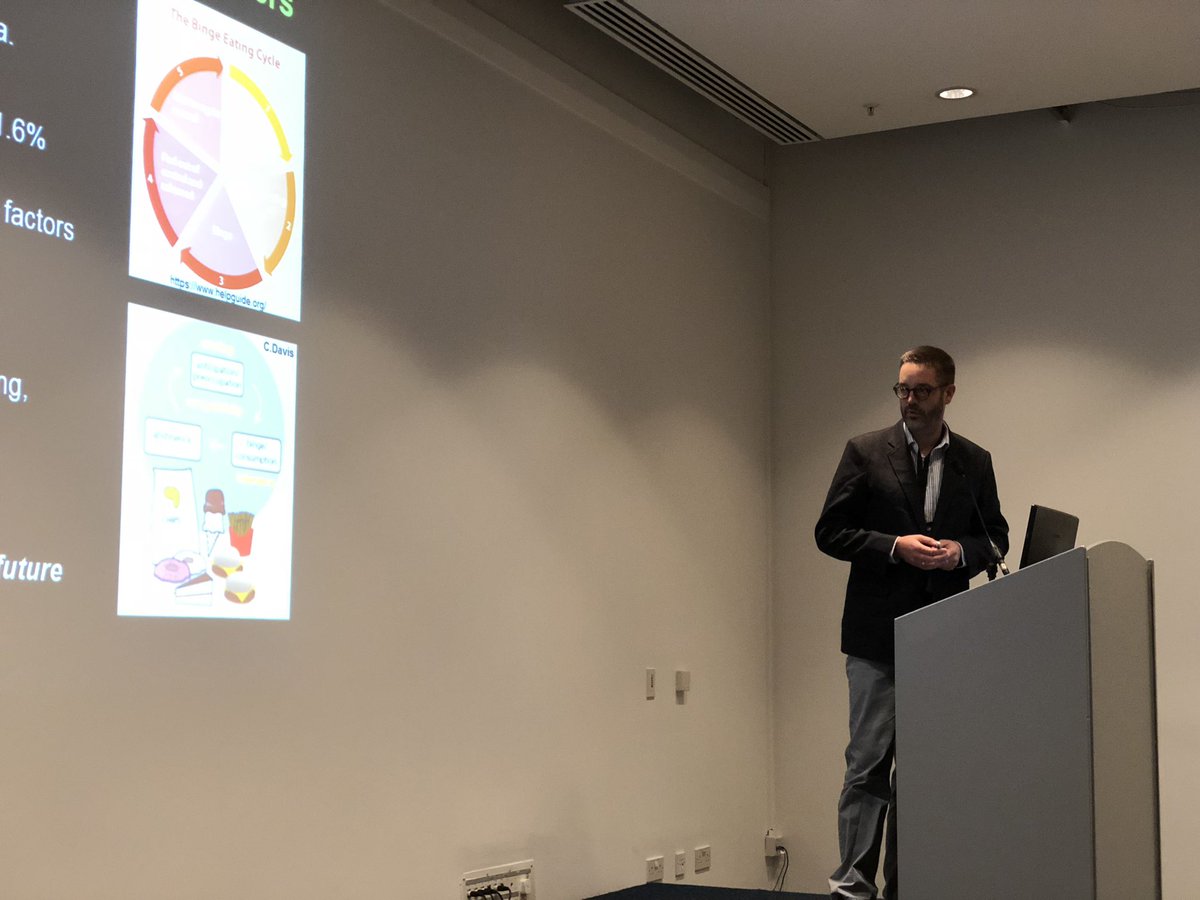
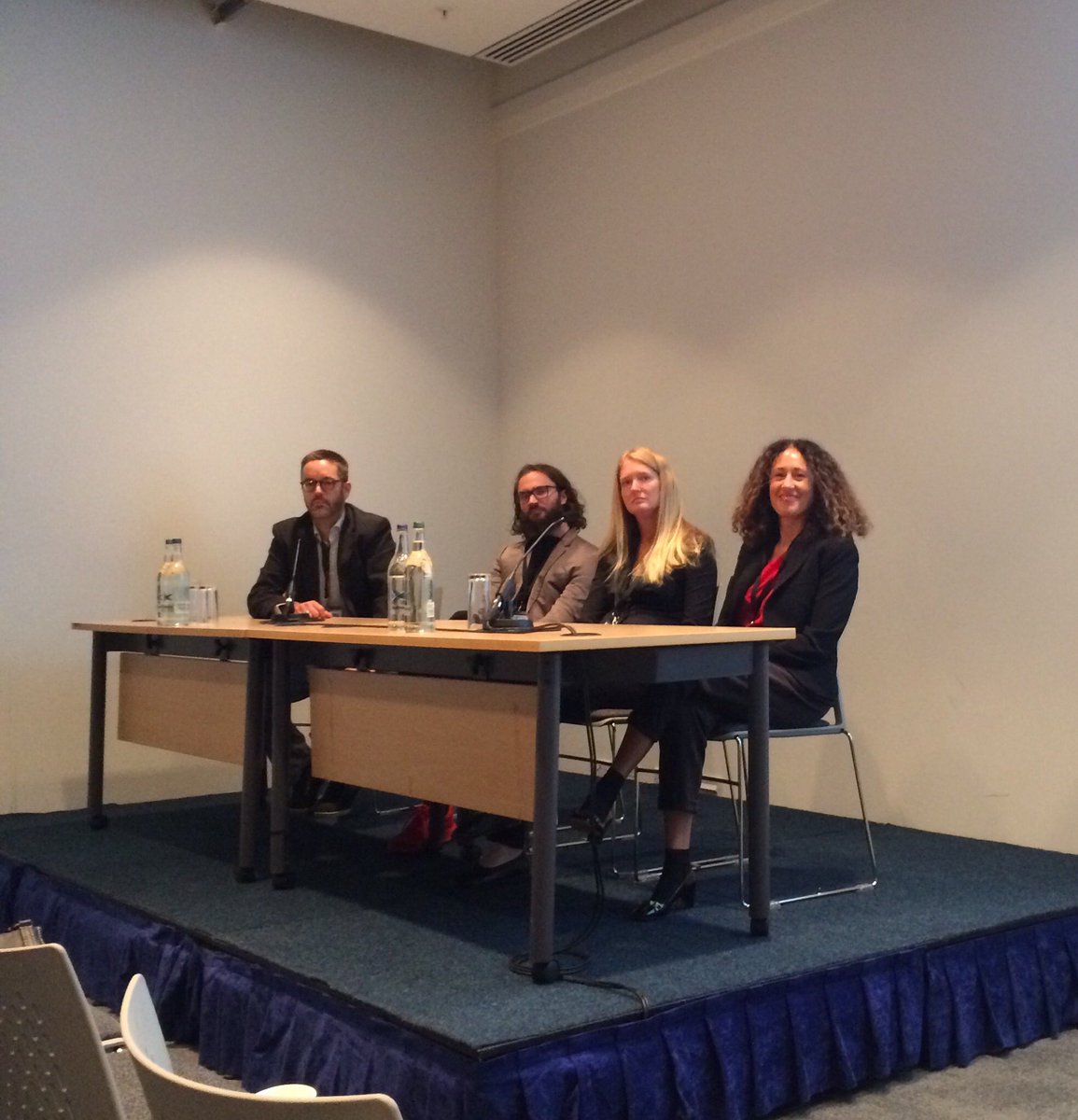
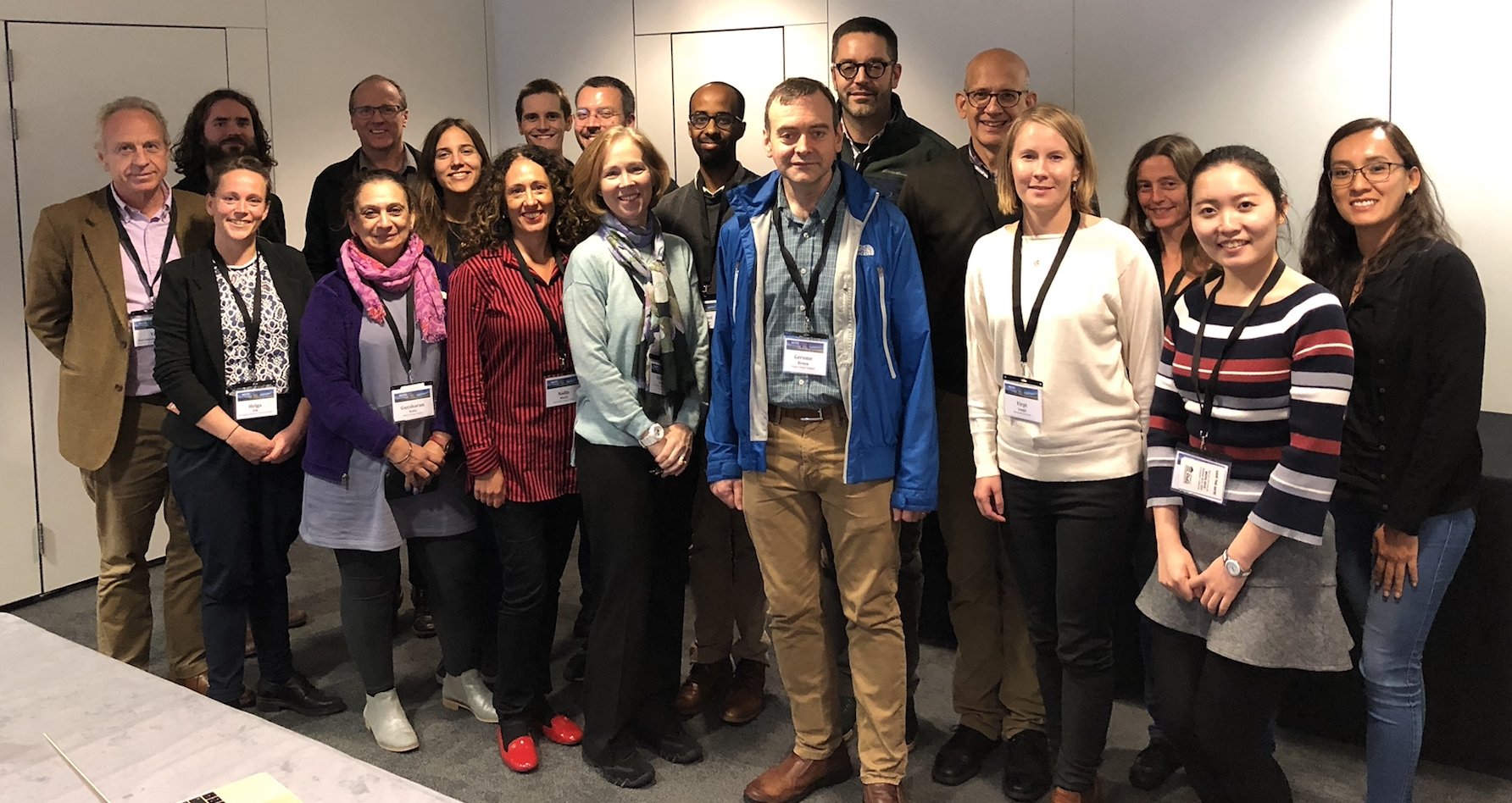
September 21, 2018: “Genetic differences in the behavioral organization of binge eating, conditioned food reward, and compulsive-like eating in C57BL/6J and DBA/2J strains” has been accepted for publication in Physiology and Behavior. Preprint posted here.
Congratulations to Keith Babbs and Julia Kelliher, co-first authors!. More pubs to come very soon, stay tuned!
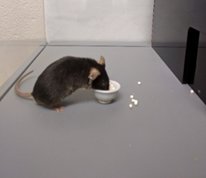
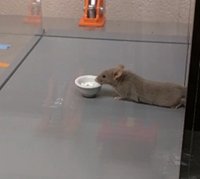
July 13, 2018: Bon Voyage, Julia Kelliher (Lab Manager)! Good luck at Penn State in your Physiology Ph.D. program!
July 9, 2018: I just found out that I will be giving a 10 min presentation at the 3rd Annual Chemistry and Pharmacology of Drug Abuse Conference (CPDA) at Northeastern University, August 2-3. The title of my talk is Gene mapping made “easy”: Reduced complexity crosses for discovering genes influencing opioid and psychostimulant addiction traits
July 8, 2018: Qiu and Neema’s paper, Changes in neuronal immunofluorescence in the C- versus N-terminal domains of hnRNP H following D1 dopamine receptor activation, was accepted for publication in Neuroscience Letters. Congratulations to everyone! This was a triple collaboration effort among BU pharmacology labs, including Bryant, Russek, and Wolozin labs. Authors include: Ruan QT*, Yazdani N*, Beierle JA, Hixson KM, Hokensen KE, Appico DJ, Luttik KP, Zheng K, Ash PEA, Szumlinski KK, Russek SJ, Wolozin B, Bryant CD
May 18, 2018: I am happy to announce that the symposium I submitted, “Mammalian Genetics of Eating Disorders: Preclinical and Clinical Genetic and Biological Risk Factors”, has been accepted for presentation at the 2018 World Congress of Psychiatric Genetics in Glasgow, Scotland. The conference will be held Oct. 11-15. The symposium will take place on Oct. 14. They received 44 symposia abstracts – 16 were accepted so “the competition was fierce”.
Symposium members include Cynthia Bulik, Ph.D. (Co-Chair, UNC, Karolinska Institutet), Camron Bryant, Ph.D. (Chair and Speaker, Boston Univ Med), Stephanie Dulawa, Ph.D. (Speaker, UCSD,), Nadia Micali, M.D., Ph.D. (Speaker, Mt. Sinai), Christopher Huebel, M.D., Ph.D. (Speaker, Karolinska Institutet), and Gerome Breen, Ph.D. (Discussant, Kings College, London)
I look forward to participating with such an impressive group of scientists. For more information on the meeting, click here
-Camron
May 10, 2018: Qiu and Jake present at Russek Student Achievement Day 2018.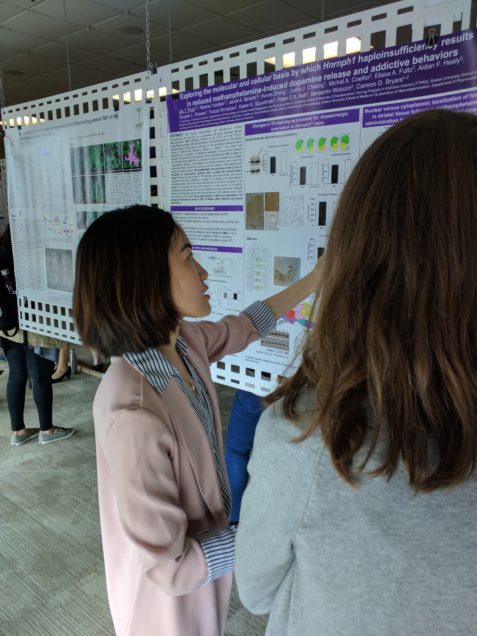
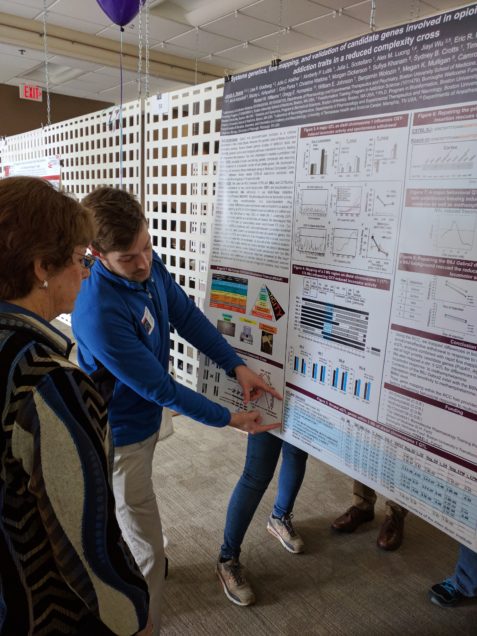
May 3, 2018: Kristyn Borrelli is accepted into Transformative Training Program in Addiction Science (TTPAS)!
May 3, 2018: Camron, Qiu, Jacob, Julia K., and Julia S. present at the 7th Annual Translation Science Symposium.
April 26, 2018: Camron, Qiu, Jacob, Julia Kelliher, and Julia Scotellaro all have their abstracts accepted for presentation at the 7th Annual Translational Science Symposium.
April 2018: Kim Luttik accepts an offer from Yale to pursue her Ph.D. in neuroscience and Julia Kelliher accepts an offer from Penn State to pursue her Ph.D. in physiology. Congratulations Kim and Julia and best of luck in your future research!
March 23, 2018: Karen Zheng and Julia Scotellaro are awarded Undergraduate Research Opportunities Program (UROP) funding for summer 2018. Karen will be working with Qiu to investigate whether the increase in non-neuronal cells in Hnrnph1+/- mice can be attributed to oligodendrocytes or astrocytes. Julia will be working with Kristyn using intracranial self-stimulation (ICSS) to study the effects of Hnrnph1+/- on reward threshold at baseline and following psychostimulant treatment.
January 8-10,2018: Camron and Jacob attend the 2018 NIDA Genetics Consortium (NGC) in Rockville, MD and the NIDA Neonatal Opioid Withdrawal Syndrome (NOWS) workshop. Pictured here are Drs. Ryan Logan (Pitt) and Clarissa Parker (Middlebury) along with Jacob and Camron (Camron’s arm is the designated selfie stick)
December 4, 2017: Past and present Palmer Lab members attend the 2017 ACNP meeting in Palm Springs (Tues. poster session – 300 posters per night!). In order of descending height: Camron Bryant, Clarissa Parker, Abe Palmer, Amanda Barkley-Levenson (postdoc), and Sandra Sanchez (postdoc). The posters were being held in a tent outside in the desert so it was quite cold!
November 29, 2017: Poster is ready for the upcoming 2017 ACNP Meeting in Palm Springs, CA. Looking forward to the dry heat and some proper tacos. here is a link to the poster
November 20, 2017: Congrats to the Wolozin Lab on acceptance of their paper in Nature Neuroscience “Reducing the RNA binding protein TIA1 protects against tau-mediated neurodegeneration in vivo” . Co-authors from the Bryant Lab include Lisa Goldberg and Neema Yazdani. The first of many collabs to bear fruit between the Wolozin and Bryant labs!
November 15, 2017: Qiu Ruan, senior graduate student in the lab, presents her work from the Bryant lab as well as work from the Szumlinski Lab on opioid addiction traits in Hnrnph1 +/- mice at the 2017 Society for Neuroscience Meeting in Washington, D.C. USA.
November 14, 2017: Keith Babbs, senior postdoc in the lab, presents he and Julia Kelliher’s work on binge eating and heritability in C57BL/6J and DBA/2J strains at BU’s Genome Science Institute annual symposium
October 13, 2017: Julia Scotellaro presents her poster at the annual UROP meeting. Julia won the 2017 Outstanding Student Researcher Award on her work investigating the inheritance of binge eating in an F1 cross between C57BL/6J and DBA/2J substrains. Congratulations again, Julia!
September 19, 2017: The first BioRxiv preprint has been posted by first author Keith Babbs, senior postdoc in the lab. Julia Kelliher (Lab Manager) is co-first author. The title is, “Genetic differences in the behavioral organization of binge eating, conditioned food reward, and compulsive-like eating in C57BL/6J and DBA/2J strains“. Fingers crossed for a speedy and successful review!
September 7, 2017: Notice of Award for Subcontract PI award. PI is Gary Peltz (Stanford Univ). The title of the award is “Computational Methods for Identification of Genetic Factors Affecting the Response to Drug Abuse“. The Bryant Lab will be responsible for phenotyping a large panel of inbred mouse strains for psychostimulant and opioid addiction traits for haplotype association mapping.
August 29, 2017: Former graduate student Lisa Goldberg, PhD accepts a post-doc position in Dr. Thomas Gould’s lab at Penn State. Best of luck and congratulations Lisa!
August 29, 2017: Undergraduate student Julia Scotellaro wins the Outstanding Student Researcher Award for UROP. Julia’s summer UROP project involved exploring the genetic architecture of binge eating in mice. Poster session soon to come on October 13! Congrats Julia!
August 28, 2017: People Behind the Science Podcast interview Dr. Bryant about his research. Don’t miss the Star Wars reference!
August 15, 2017: Diego, our STaRS student, concludes his summer fellowship with a terrific presentation of his findings about Hnrnph1 in a poster session. Great job at the poster session and in the lab this summer, Diego! Time for your next challenge!
June 21, 2017: Nice write-up on genetics and addiction in Vice magazine that includes my answers to questions regarding Lisa’s Csnk1e paper: https://www.vice.com/en_us/article/addiction-is-the-worst-kind-of-inheritance
June 13, 2017: Press release on Lisa’s Csnk1e paper (see below) can be found here: https://www.sciencedaily.com/releases/2017/06/170613111729.htm
June 5, 2017: Diego Trujillo, a STaRS student from Las Vegas, New Mexico, started his summer fellowship today. Diego will be working with Qiu Ruan to understand neuronal adaptations in the reward circuitry underlying the effects of Hnrnph1 deletion on behavior and potentially testing functional variants on protein expression. Welcome to the lab, Diego!
June 5 , 2017: Dr. Lisa R. Goldberg’s manuscript “Casein kinase 1-epsilon deletion increases mu opioid receptor-dependent behaviors and binge eating” has been accepted for publication in Genes, Brain and Behavior. A notable finding from this paper was a massive Genotype x Sex interaction in binge eating whereby female Csnk1e knockout mice showed a rapid escalation in palatable food consumption whereas the knockout males showed no such change (see below; data were generated by Stacey Kirkpatrick and analyzed by Lisa Goldberg and R. Keith Babbs). Congratulations, Lisa! One down, one more to go!
May 4, 2017: Kristyn Borrelli, Ph.D. student in Graduate Program in Neuroscience, has joined the lab. Kristyn is interested in epigenetics of addiction and will potentially work on developing an early life stress model for examining G x E interactions in addiction traits. Welcome!
May 2, 2017: BU Today ran an article on The Laboratory of Addiction Genetics about our paper issued in Biological Psychiatry on May 1, 2017 on Cyfip2 and binge eating. http://www.bu.edu/today/2017/binge-eating-gene/
Click here for the published article and click here for a commentary on our findings.
April 14, 2017: Congrats to Neema for winning the prestigious Russek Award!: “On behalf of the review committee, it is my pleasure to congratulate you on winning the first prize Student Achievement Award for the upcoming Henry I. Russek Day. The prize is an acknowledgement of not just your research and academic excellence, but also your outstanding service and contributions to the community. You will soon be receiving details about the schedule for that day, but for your planning purposes please prepare a talk of seven minutes with three minutes for questions.”
April 7, 2017: Jacob Beierle, 1st year Ph.D. student in Biomolecular Pharmacology, has joined the lab! Jacob is going to be the “opioid guy”; that is pretty much all we know at this point. Welcome!
April 3, 2017: R. Keith Babbs’s (senior postdoc) abstract was selected for a talk at IBANGS 2017 in Madrid, Spain! Keith will be presenting new data on the effects of Cyfip1 haploinsufficiency on compulsive and binge eating behaviors. Congratulations, Keith!
March 24, 2017: BU Today came by the lab today to complete a photo shoot of an article running next week on Stacey’s Biological Psychiatry paper. I will post the pics and article next week. Stay tuned!
March 23, 2017: Neema Yazdani successfully defended his dissertation today – “Neurobiological mechanisms of Heterogeneous Nuclear Ribonucleoprotein H1 in methamphetamine stimulant and addictive behaviors”. Congratulations, Dr. Yazdani! What a week!
March 15, 2017: Lisa Goldberg defended her dissertation today – “Systems Genetic Analysis of Addiction-Relevant Traits in Mice”. Congratulations, Dr. Goldberg! She absolutely nailed her talk! Dr. Goldberg is on the market for a postdoc. Now is your chance to hire this fully trained pharmacologist and behavioral geneticist into your lab!
October 25, 2016: Stacey’s paper “Cytoplasmic FMR1-interacting protein 2 is a major genetic factor underlying binge eating” is now available online: http://dx.doi.org/10.1016/j.biopsych.2016.10.021
October 19, 2016: Former Lab Manager and current University of Florida Medical Student, Stacey Kirkpatrick‘s manuscript titled “Cytoplasmic FMR1-interacting protein 2 is a major genetic factor underlying binge eating” has been accepted for publication in Biological Psychiatry. Congratulations Stacey!
October 18, 2016: Per invitation of Dr. Barak Caine, Dr. Bryant delivered a talk titled “Systems genetic analysis of drug and food addiction traits in mice” for the Neuroscience Seminar Series at McLean Hospital, Harvard Medical School.
September 30, 2016: In completion of his training under the BU Transformative Training Program in Addiction Science (TTPAS), Neema Yazdani (fifth year PhD Candidate) delivered a talk titled “Neurobiological mechanisms of hnRNP H1 in methamphetamine addictive behaviors”.
September 28, 2016: Kimberly Luttik won the UROP Outstanding Researcher Award for her summer 2016 project. The UROP poster event will take place on Friday, October 21 at the GSU Metcalf Ballroom, where Kim will present her award-winning research.
June 7, 2016: Lisa Goldberg, Ph.D. candidate and senior graduate student in the lab, has been accepted into the competitive Cold Spring Harbor’s course, “Cellular Biology of Addiction“, to be held in University of Cambridge, UK July 31-August 7. Instructors include Belin, Bonci, Evans, and Kieffer. The lineup for the course includes Boutrel, Dalley, Ersche, Everitt, Goldman, Kenny, Koob, Maldonado, Mason, Picciotto, Schumann, and Spanagel. Wow! Congrats Lisa!
June 2, 2016: Sai Nedu has re-joined the lab for the summer! Sai first began working in the lab in the summer of 2015. He recently finished his first year as an undergraduate at Tulane University in NOLO. He is majoring in Neuroscience and plans to attend medical school. Welcome back, Sai!
June 1, 2016: Neema Yazdani, who is currently training under Dr. Karen Szumlinski at UC Santa Barbara, delivered a mini-lecture on his research for the senior undergraduate course Psychopharmacology: Psychotherapeutic Drugs (PSY133).
May 31, 2016: Fred Rodriguez, NIDA Summer Trainee started his 8-week competitive fellowship today. Fred is an undergraduate from Binghamton University and is working with Keith Babbs (senior postdoc) to examine allelic interaction of Hnrnph1 polymorphisms in affecting methamphetamine behaviors. Welcome, Fred!
May 27, 2016: Stacey Kirkpatrick, Lab Manager (2012-2016), has resigned from the laboratory as she prepares to begin a new chapter of her life in medical school at University of Florida in Gainesville, FL. Stacey has been here from the very beginning and set up the lab from scratch. She has trained probably dozens of high school, undergraduate, professional students, and postdocs and has been a central part of every aspect of the lab, including personnel management, project management, development of research methodologies and analysis, and general managerial duties of the lab. Furthermore, she was the first to publish a first author paper in the lab and has a second, high impact paper that we are preparing for publication regarding the first genome-wide significant identification of a major genetic factor underlying binge eating. Stacey will be sorely missed and we wish her the best of luck on her path to becoming a physician. Bon Voyage!
May 25, 2016: Dr. Bryant is co-author on a manuscript that was just accepted in Genes, Brain and Behavior after being in revision for 7 years! The title of the paper is, ” Systems genetic and pharmacological analysis identifies candidate genes underlying mechanosensation in the Von Frey test“.
May 2, 2016: Qiu Ruan, first-year PhD student in Biomolecular Pharmacology in the Laboratory of Addiction Genetics, has been accepted into the Transformative Training Program in Addiction Science (TTPAS), supported by the Burroughs-Wellcome Fund and co-chaired by Drs. Linsday Farrer and Richard Saitz. More detail about this trans-disciplinary training program can be found on: http://www.bumc.bu.edu/gms/ttpas/
April 29, 2016: Lisa Goldberg, a fifth year PhD candidate in the Biomedical Neuroscience program in Dr. Bryant’s lab, received a Young Investigator Travel Award for the 18th Annual International Behavioral and Neural Genetics Society (IBANGS) meeting in Bar Harbor, ME. She was also selected to present her research as an oral presentation titled, “Quantitative Trait Locus Mapping of Oxycodone Reward and Naloxone Aversion in C57BL/6 Substrains”. Congratulations, Lisa!
March 29, 2016: Neema Yazdani‘s data brief article titled “Striatal transcriptome analysis of a congenic mouse line (chromosome 11: 50-60 Mb) exhibiting reduced methamphetamine sensitivity” was accepted for publication in Genomics Data. Co-authors include Evan Johnson and Ying Shen. This article provides a more in depth description of the the RNA-seq methods utilized for C57BL/6J x DBA/2J congenic (Line 4a) transcriptome analysis, previously published in his PLOS Genetics paper “Hnrnph1 is a quantitive trait gene for methamphetamine sensitivity.” Congratulations!
March 24, 2016: Kimberly Luttik was awarded a UROP grant for research in the laboratory this coming summer. Congratulations, Kim!
March 18, 2016: Neema Yazdani received the Ruth L. Kirschstein NRSA Predoctoral Fellowship (F31) from NIDA for his proposal titled “Functional mechanisms of Hnrnph1 in methamphetamine addictive behaviors”. His sponsor for the award is Dr. Camron D. Bryant and Co-Sponsor is Dr. Benjamin Wolozin. Neema’s training under this award includes characterizing differences in methamphetamine (MA) reward and volitional administration in Hnrnph1+/- mice through behavioral assessments including conditioned place preference (CPP) and operant oral self-administration. He will also investigate the neurobiological mechanisms underlying reduced MA sensitivity and reward in Hnrnph1+/- mice using brain tissue immunohistochemistry, RNA-seq, and in vivo microdialysis. Neema will spend this upcoming summer training in operant oral self-administration and in vivo microdialysis in the laboratory of Dr. Karen Szumlinski at UC Santa Barbara. Congratulations, Neema!
March 14, 2016:Jiayi Wu, Ph.D. Student in the Program in Biomedical Sciences (PiBS), started her rotation in the lab this week. Jiayi is conducting striatal RNA-seq analysis of binge eating in Cyfip2 heterozygous knockout mice.
December 10, 2015: Neema Yazdani‘s paper Hnrnph1 Is A Quantitative Trait Gene for Methamphetamine Sensitivity was published in PLOS Genetics! You can read the paper here.
December 9, 2015: Camron Bryant was elected as an Associate Member in the American College of Neuropsychopharmacology (ACNP).
“The American College of Neuropsychopharmacology (ACNP) is a professional organization of leading brain scientists. The principal functions of the College are research and education. Our goals in research are to offer investigators an opportunity for cross-disciplinary communication and to promote the application of various scientific disciplines to the study of the brain’s effect on behavior, with a focus on mental illness of all forms. Our educational goals are to encourage young scientists to enter research careers in neuropsychopharmacology and to develop and provide accurate information about behavioral disorders and their pharmacological treatment.”
For more information, click here.
November 9, 2015: Today was a two-fer. Dr. Bryant‘s review article (Neema is a co-author) was accepted for publication in Genes, Brain and Behavior. The title of the review is, “RNA binding proteins, neural development and the addictions”. See more information on this research here.
November 10, 2015: Neema Yazdani, now a fourth year graduate student in the lab, was invited to give a talk at the 2015 BU Genome Science Institute Research Symposium. The title of his talk is: “HnRNP H1 regulates the stimulant and addictive properties of methamphetamine: Transcriptomic and spliceomic analyses uncover novel neurodevelopmental mechanism”. Congratulations, Neema!!
November 9, 2015: Neema Yazdani‘s paper, “Hnrnph1 is a quantitative trait gene for methamphetamine sensitivity” was accepted for publication in PLOS Genetics. Neema used TALENs-mediated genome editing and RNA-seq to validate H1 as a QTG for the stimulant properties of meth and a likely neural mechanism involving a deficit in neural development of the dopaminergic circuitry in the brain. Congrats to Neema!
November 2015: Lisa Goldberg was awarded the Carl E. Rosow Award for Pharmacology Education by the Department of Pharmacology and Experimental Therapeutics for her outstanding work in her teaching assistant position for Behavioral Pharmacology in Spring 2014 and her teaching fellowship for Introduction to Neuroscience in Fall 2015. Congratulations, Lisa!
October 17-21, 2015: Lisa Goldberg and Neema Yazdani attended the 2015 Society for Neuroscience conference in Chicago, IL, where they presented their posters.
Lisa’s poster: Quantitative Trait Locus Mapping of Oxycodone Reward and Naloxone Aversion in C57BL/6 Substrains
Neema’s poster: Hnrnph1 is a quantitative trait gene for methamphetamine sensitivity
October 2015: Sydney Crotts, Justin Cheung, and Benjamin Chew, all undergraduates at Boston University, have begun working in the laboratory. Welcome!
September 9, 2015: Dr. Bryant was awarded 1R21DA038738-01A1: Genetic basis of binge eating and its motivational components in a reduced complexity cross. The goal is to identify novel genetic factors and neurobiological mechanisms that regulate phenotypic variation in binge eating in a cross between closely related C57BL/6 inbred strains.
September 2015: Samantha Shelton, a 1st year PhD student of Neuroscience at Boston University, and Eric Reed have begun rotating in the laboratory. Welcome, Samantha and Eric!
August 29, 2015: The Bryant Lab is currently looking to hire Postdocs. Please contact Dr. Camron Bryant at camron@bu.edu with a CV if interested.
June 15, 2015: Joshua Wortzel started his summer position in the lab. Josh is a rising second-year medical student at Stanford University and is funded by the Stanford Medical Scholar Program to study the molecular mechanisms of the placebo effect. Josh also has an interest in hypnotism and other forms of alternative medicine. This summer he will study the correlation between placebo responsiveness and conditioned opioid reward behaviors in mice. His goal is to apply Pavlovian conditioning strategies that he learns this summer toward future studies involving the immune system.
June 1, 2015: Jenna Grant started her summer position in the lab working under the guidance of Neema Yazdani, Ph.D. candidate in the laboratory. Jenna is a summer intern who is funded by the National Institute on Drug Abuse (NIDA) and is currently investigating methamphetamine-induced signaling in casein kinase 1-epsilon knockout mice. Jenna is currently an undergraduate researcher at the University of New Orleans and is majoring in biology. Her future plan is to complete a Ph.D. in neurobiology/neuroscience.
May 15, 2015: Dr. Bryant (PI) was awarded 1R01DA039168-01A1, “Bridging genetic variation with behavior: Molecular and functional mechanisms of quantitative trait gene regulation of the stimulant and addictive properties of methamphetamine in mice”. Dr. Karen Szumlinski is a Co-I on the grant and the two labs will use genome editing, RNA-seq, immunohistochemistry, and in vivo microdialysis to elucidate the role of Hnrnph1 in methamphetamine addiction-relevant behaviors.
May 15, 2015: Dr. Bryant‘s abstract, “Food, Drugs, and QTLs: Mapping behavioral addiction traits in the Reduced Complexity Cross”, was accepted for an oral presentation for the 2015 Complex Trait Community Meeting in Portland, Oregon (http://www.complextrait.org/ctc2015/).
May 8, 2015: Lisa Goldberg, senior Ph.D. candidate in the lab, won a travel award for the 2015 International Narcotics Research Conference to be held in Phoenix, AZ (http://www.inrcworld.org/2015/2015mtg.htm). Lisa will be presenting her work regarding behavioral and transcriptome analysis of casein kinase 1-epsilon knockout mice. In addition to presenting a poster, Lisa will also be participating in a Data Blitz where she will present new data where she has identified QTLs influencing behaviors associated with opioid reward and aversion.
April 23, 2015: Dr. Bryant was elected by the Society as Member at Large for the International Behavioural and Neural Genetics Society for 2015-2018. Members-at-large work with the President and Executive Committee on specific issues, including website management, updating the news section, and maintaining communication with other meetings and societies such as FENS.
May 19 – 23, 2015: The IBANGS 2015 conference was held in Uppsala, Sweden. See more pictures from the event here.
March 27, 2015: Kelsey Landaverde, undergraduate researcher in the Laboratory of Addiction Genetics, received a competitive UROP stipend award to study the mechanisms of placebo responding to anxiolytic treatment in mice. This project is part of a long-term goal to develop mouse models of placebo responding that can be subjected to forward genetic analysis. The “Placebo Effect” is a clinical phenomenon whereby patients, in particular those paitents experiencing pain, Parkinson’s disease, depression, or anxiety are particularly prone to exhibiting symptomatic relief in response to biologically inert substances that have no clinical utility. A long-standing hypothesis in the field is that the expectation of reward induces a neurobiolgical response that mediates symptomatic, though the neurobiological mechanisms by which these responses are induced remain largely unknown. Phenotypic variation in placebo responding suggests a genetic component; thus, the identification of novel genes mediating placebo-like responding in mice could have translational impact for understanding the genetic basis of placebo responding in humans.
March 11, 2015: Neema Yazdani, a third year PhD candidate and Biomolecular Pharmacology student in Dr. Bryant’s lab, is one of two graduate students selected for the 2015 “Outstanding Graduate Student Travel Award” for the 17th Annual International Behavioral and Neural Genetics Society (IBANGS) Meeting in Uppsala, Sweden. As a recipient of this award, Neema is invited to present his research as an oral presentation titled, “Hnrnph1 is a quantitative trait gene for methamphetamine sensitivity”. Neema’s efforts in generating and phenotyping TALENs-targeted Hnrnph1 knockout mice combined with striatal transcriptome analysis via RNA-seq led to the identification of Hnrnph1 as a novel quantitative trait gene involved in the stimulant response to methamphetamine. His transcriptome results suggest that Hnrnph1 could regulate the neural development of the mesocorticolimbic circuitry which would have widespread implications for understanding the etiology of a variety of neurobiological disorders involving a dysregulation of dopamine transmission.
January 6, 2015: Olga Lacki (Boston University Junior, Neuroscience Major) has once again received stipend support from BU’s UROP program for undergraduate research. Olga will continue to investigate the role of Csnk1e in signaling and addiction traits in response to drugs of abuse. Congratulations to Olga and a thank you to UROP for continuing to fund the research in our lab!
January 5, 2015: Dr. Bryant received the Jack Spivack Excellence in Neurosciences Research Award at Boston University which recognizes and supports the research of an outstanding faculty member at Boston University School of Medicine who is pursuing neurosciences research. Award recipients shall be conducting either clinical or basic neurosciences research in the areas of Parkinson’s, Alzheimer’s, Chronic Traumatic Encephalopathy and/or other neurological disorders.
December 16, 2014: Stacey Kirkpatrick’s manuscript, “Behavioral architecture of opioid reward and aversion in C57BL/6 substrains” was accepted for publication in Frontiers in Behavioral Neuroscience. Here, Stacey applied factor analysis toward multiple behaviors that were assessed in the conditioned place preference/aversion paradigm (CPP/CPA) and identified novel relationships that account for behavioral variation in oxycodone reward versus naloxone aversion. These results enhance our understanding of the behavioral structure of motivated behavior and provide a novel approach to assessing the genetic basis of substance abuse liability.
October 21, 2014: Dr. Bryant’s symposium proposal, “Genomic and neurobiological studies of RNA binding proteins in complex traits relevant to psychiatric disorders”, has been accepted for the 2015 Winter Conference on Brain Research in Big Sky, MA, to be held January 24-29.
July 25, 2014: Lisa Goldberg, Senior Graduate Student and Ph.D. Candidate in the Laboratory of Addiction Genetics, was accepted into the Short Course on the Genetics of Addiction at The Jackson Laboratory (http://courses.jax.org/2014/addiction.html) and was awarded a $1200 scholarship to attend the course by the National Institute on Drug Abuse.
June 20, 2014: Neema Yazdani, Graduate Student and Ph.D. Candidate in the Laboratory of Addiction Genetics, was accepted into the Short Course on the Genetics of Addiction at The Jackson Laboratory (http://courses.jax.org/2014/addiction.html). Neema is currently a trainee in the Transformative Training Program in Addiction Science (TTPAS; http://www.bumc.bu.edu/gms/ttpas/). TTPAS has generously agreed to provide funding for Neema to attend the course.
May 27, 2014: Dr. Bryant was awarded an R03 from NIDA, “Mapping G x E Interactions for Addiction Traits in a Reduced Complexity Cross”. The goal is to use closely related substrains of C57BL/6 mice to map gene by environment interactions in opioid reward, tolerance, and dependence caused by social drug cues of the cage mates. The findings gleaned from these studies will aid in understanding how the social context of the drug environment can potentially interact with one’s genome to influence behavioral traits that comprise addiction.
May 10-14, 2014: Members of the Laboratory of Addiction Genetics, including Dr. Bryant, Lisa Goldberg, Neema Yazdani, and Stacey Kirkpatrick attended the International Behavioural and Neural Genetics Society meeting in Chicago, IL. Members of the lab presented posters on their research and Dr. Bryant chaired a symposium, “Behavioral, neural, and genetic studies of compulsive eating in model organisms and humans” and presented the Young Scientist Lecture, “Genes, brain and addiction Traits: Moving from discovery toward validation and mechanism.”
April 28, 2014: Dr. Bryant gave a lecture at the Center for Studies of Addiction at University of Pennsylvania titled, “Mouse genomics and the neurobiology of substance abuse behavior: From drugs to food.
April 18, 2014: Dr. Bryant gave a lecture in the Department of Psychology Seminar at Middlebury College titled, “From drugs to food: Genetic approaches to the neurobiology of substance abuse in mice.”
March 31, 2014: Olga Lacki, undergraduate researcher (Neuroscience major, minor in Visual Arts), was awarded a competitive UROP summer scholarship for undergraduate research. Olga’s project is focused on identifying differences in psychostimulant and opioid-induced changes in cell signaling in the striatum as a consequence of inheriting a null mutation in casein kinase 1-epsilon (Csnk1e).
January 25-30: Dr. Bryant attended the 47th Annual Winter Conference on Brain Research at Steamboat Springs, CO. He gave a talk in the “CK1 and brain function” symposium titled, “A role for casein kinase 1-epsilon in the motivational properties of drugs of abuse.”
January 11, 2014: Dr. Bryant’s symposium proposal for the 2014 IBANGS Meeting in Chicago, IL has been accepted as one of six symposia scheduled for this year’s meeting. The title of the symposium that Dr. Bryant will chair is, “Behavioral, neural and genetic studies of compulsive eating in model organisms and humans.”
January 7, 2014: Alexis Washburn, a freshman undergraduate researcher in the Laboratory of Addiction Genetics, won a competitive Undegraduate Research Opportunity Program (UROP) Grant Award at Boston University for the Spring 2014 semester. This award includes both a stipend and money to help cover research costs. Alexis will have the opportunity to present her research at the Undergraduate Research Symposium in the fall. Alexis’s project involves using QTL mapping to identify novel genetic factors influencing compulsive eating in mice and has relevance toward understanding the genetic and biological mechanisms of eating disorders in humans. The long-term goal is to develop new avenues for prevention and treatment of these highly lethal, neuropsychiatric disorders.
December 17, 2013: Dr. Bryant has been selected as the recipient of the 2014 IBANGS Young Scientist Award. The Young Scientist Award honors a scientist who is 7 or fewer years post first faculty or faculty-equivalent appointment, and whose area of research is in behavioural and neural genetics. Key considerations are the scientific importance of research discoveries, record of achievement and future scientific plans and projected impact on the field.
November 16, 2013: A manuscript co-authored by Dr. Bryant has been accepted in the journal, Sleep, titled “The circadian clock gene Csnk1e regulates REM sleep and NREM sleep architecture in mice.”
October 18, 2013: Dr. Bryant’s presentation abstract was selected for a Travel Fellowship for the 2014 Winter Conference on Brain Research to be held in Steamboat Springs, Colorado.
October 16, 2013: Dr. Bryant has been invited to speak at the 47th Annual Winter Conference on Brain Research (WCBR) in Steamboat Springs, CO. He will be speaking in a symposium on CK1 and brain function. The title of his talk is, “A role for casein kinase 1-epsilon in the motivational properties of drugs of abuse.” He will be discussing Lisa Goldberg’s recent work regarding drug reward and dopaminergic signaling in CK1E knockout mice.
September 4, 2013: Dr. Bryant’s poster abstract, “A 0.23 Mb region regulates methamphetamine sensitivity in mice”, was selected among several hundred abstracts for a short oral presentation at the 2013 World Congress of Psychiatric Genetics (WCPG) held here in Boston. He will be speaking this Friday, October 18 during the afternoon poster talk workshop session (12:00-2:15 p.m.).
August 28, 2013: Neema Yazdani, M.S., second-year Ph.D. Student in Biomolecular Pharmacology in the Laboratory of Addiction Genetics, has been accepted into the Transformative Training Program in Addiction Science, supported by the Burroughs-Wellcome Fund and co-chaired by by Drs. Lindsay Farrer and Tim Heeren. For more information on this exciting multi-disciplinary training program in addiction see here (http://www.bumc.bu.edu/gms/ttpas/)
August 1, 2013: Neema Yazdani, M.S., second-year Ph.D. Student in Biomolecular Pharmacology, has joined the Laboratory of Addiction Genetics. Neema is using designer endonucleases to target novel candidate genes for methamphetamine-induced behavioral addiction traits and will be defining the cellular and molecular mechanisms of action that mediate genetic variation on behavior.
March 8, 2013: Dr. Bryant won the Outstanding Junior Faculty Travel Award for the 2013 International Behavioural and Neural Genetics Society (IBANGS) in Leuven, Belgium. Dr. Bryant’s abstract was selected for an invited talk that he will present during the Awardee session on May 21. In addition, Dr. Bryant will be provided with a stipend to cover his travel expenses.
December 3, 2012: Dr. Bryant presented his poster at the American College of Neuropsychopharmacology (ACNP) meeting, “A 0.23 Mb region on mouse chromosome 11 contains three possible genes influencing methamphetamine sensitivity” in Hollywood, FL. Please click here for a link to his poster.
November 30, 2012: Lisa Goldberg, a second year graduate student in Biomolecular Pharmacology and the Program in Biomedical Neuroscience has joined the Laboratory of Addiction Genetics. Welcome aboard, Lisa!
November 12, 2012: Dr. Bryant’s manuscript, “Bryant et al., in press” was accepted in Addiction Biology.
